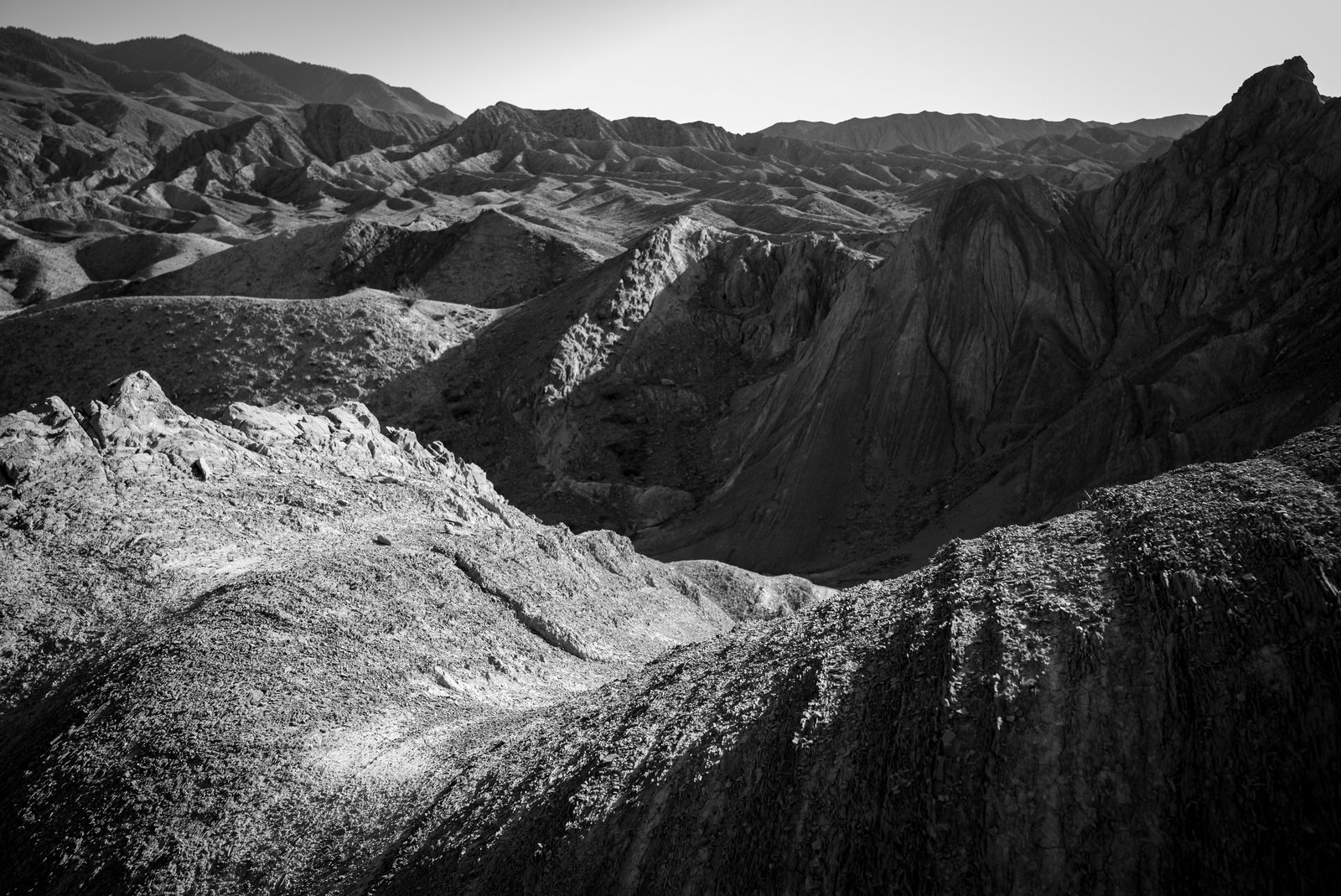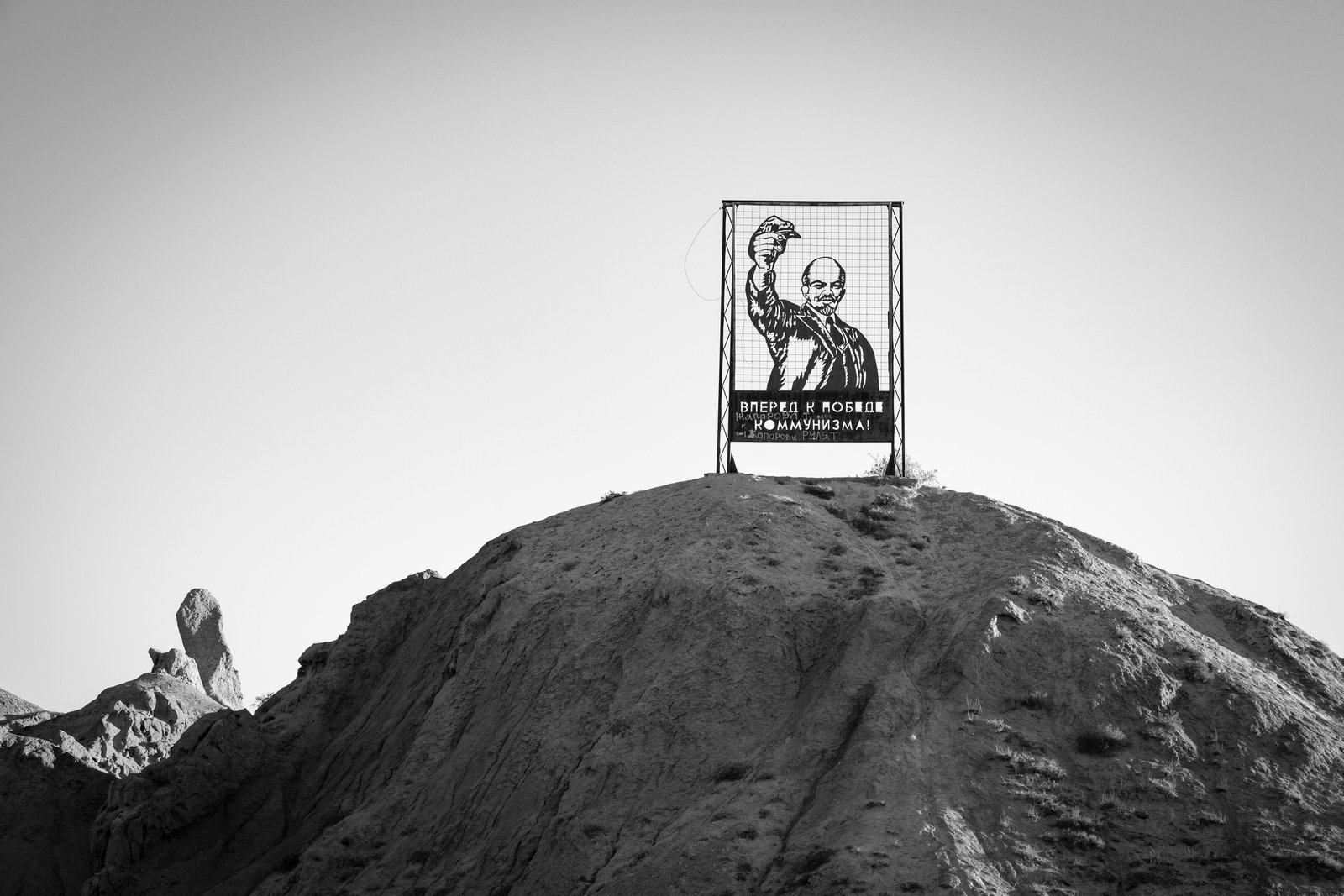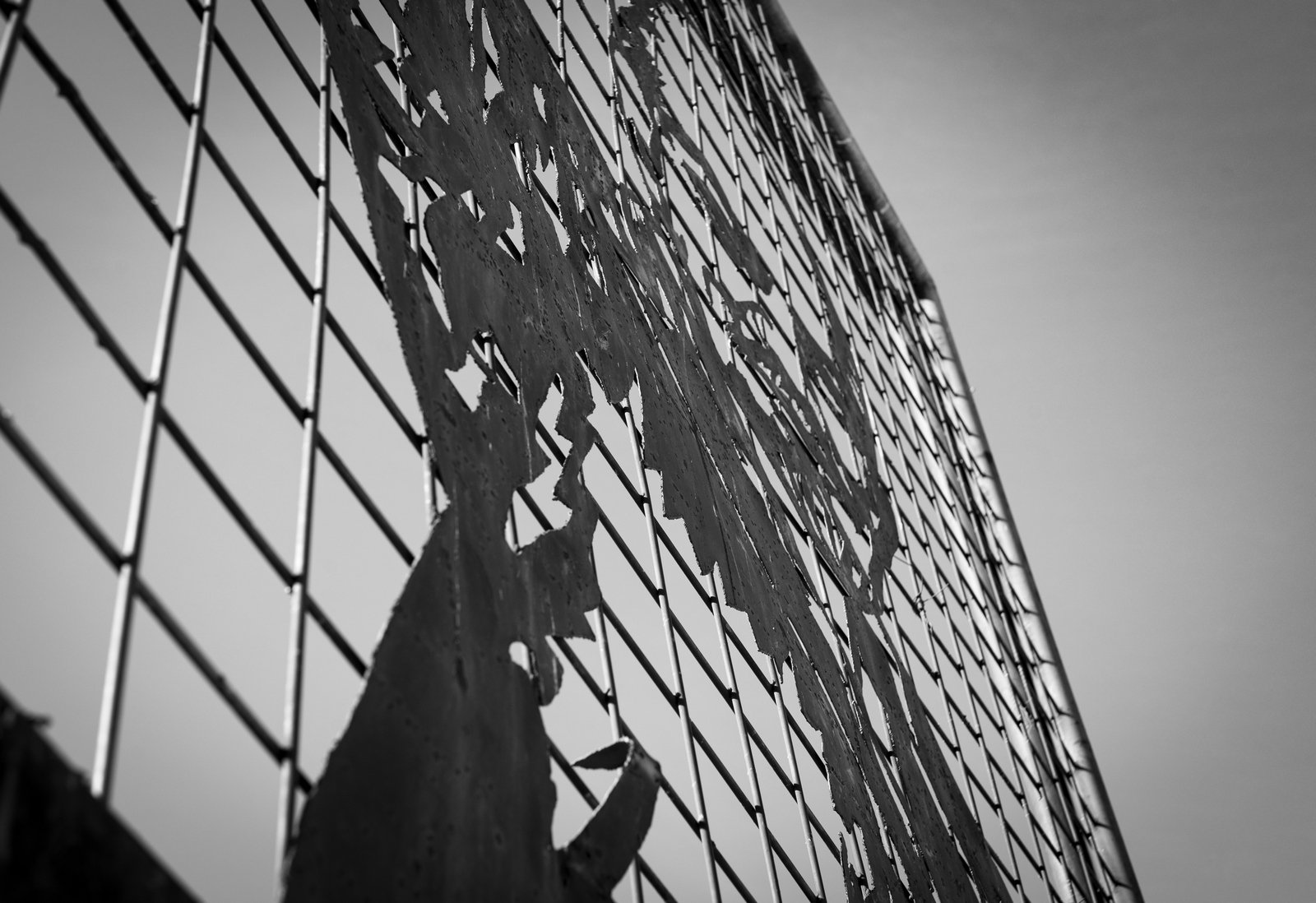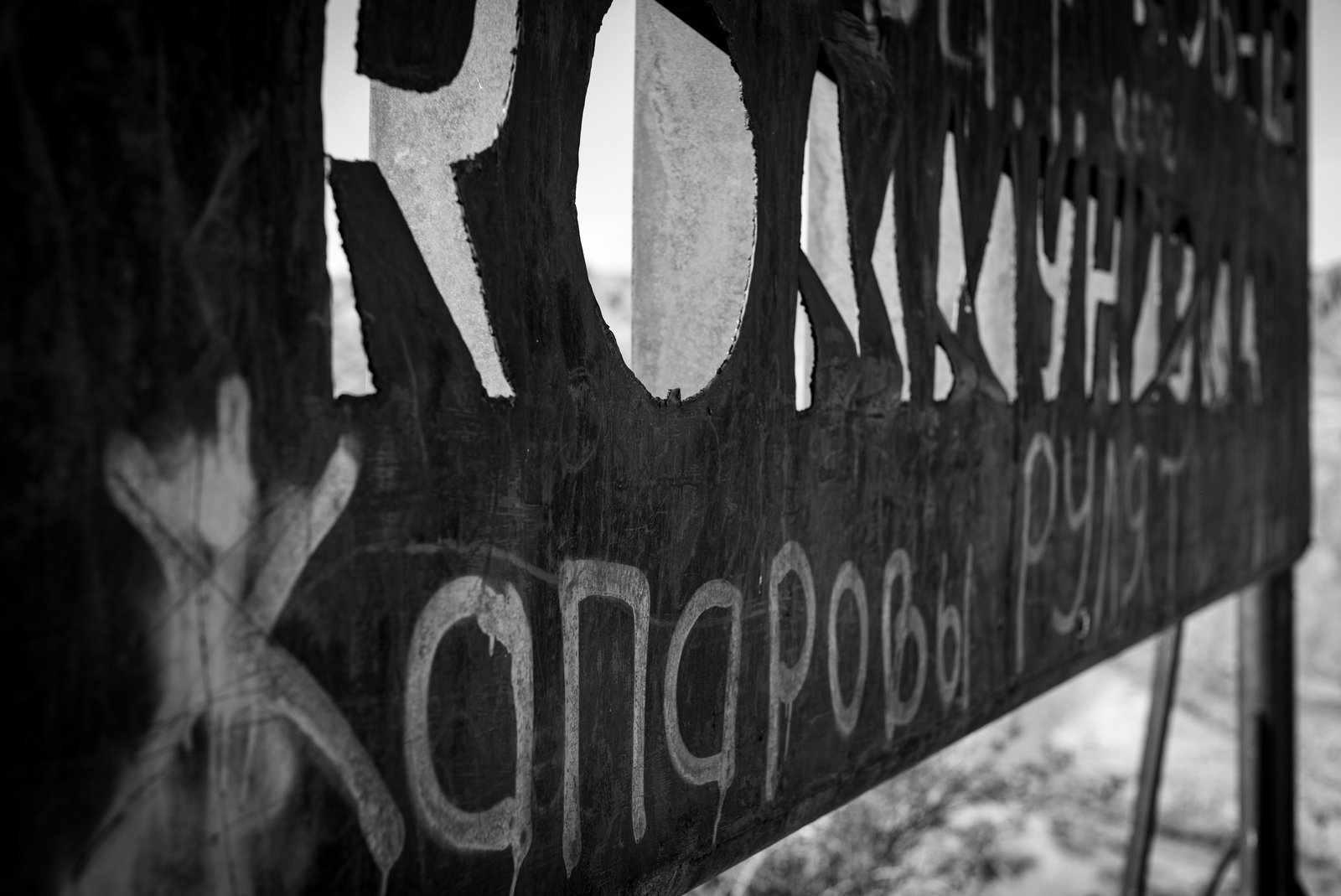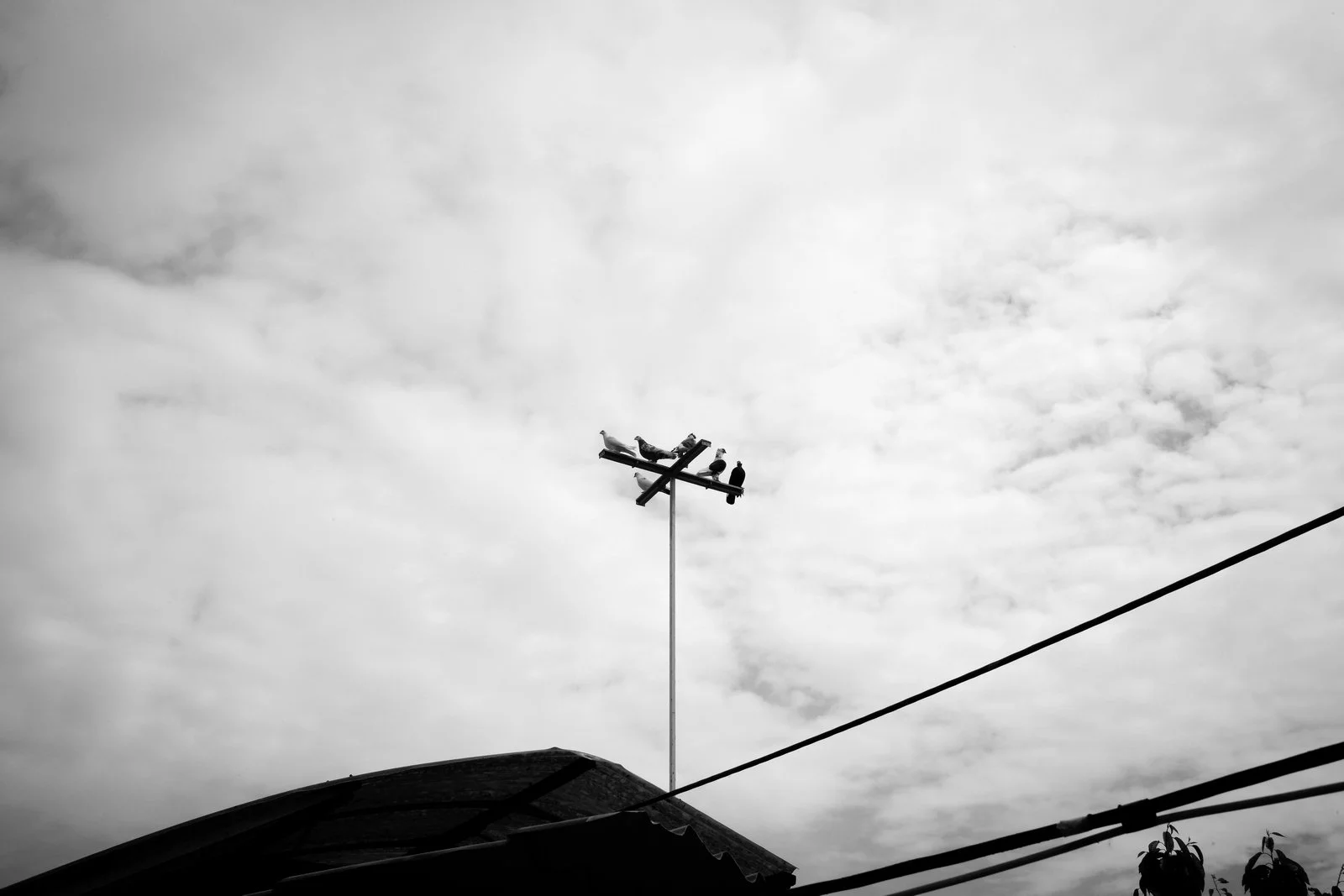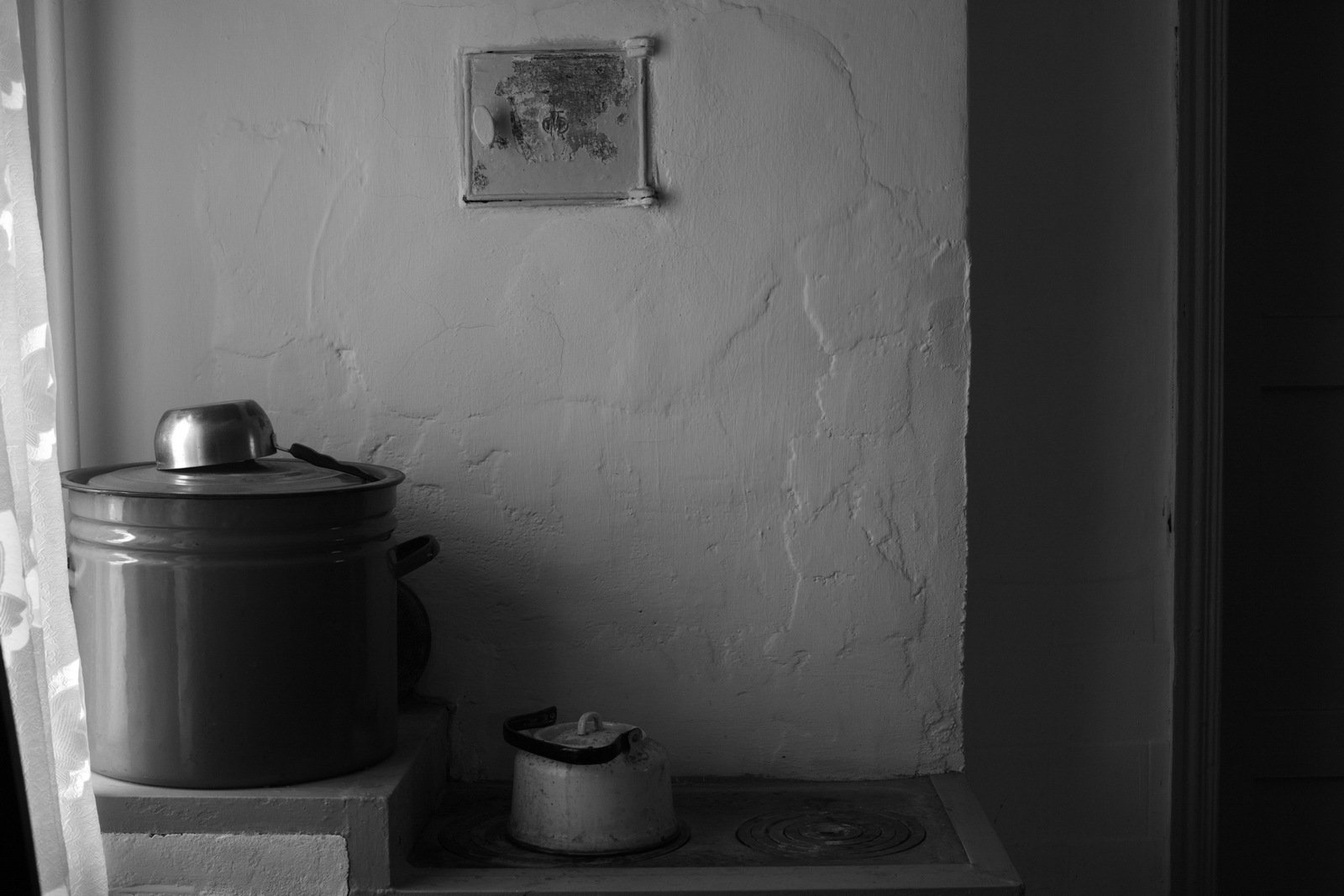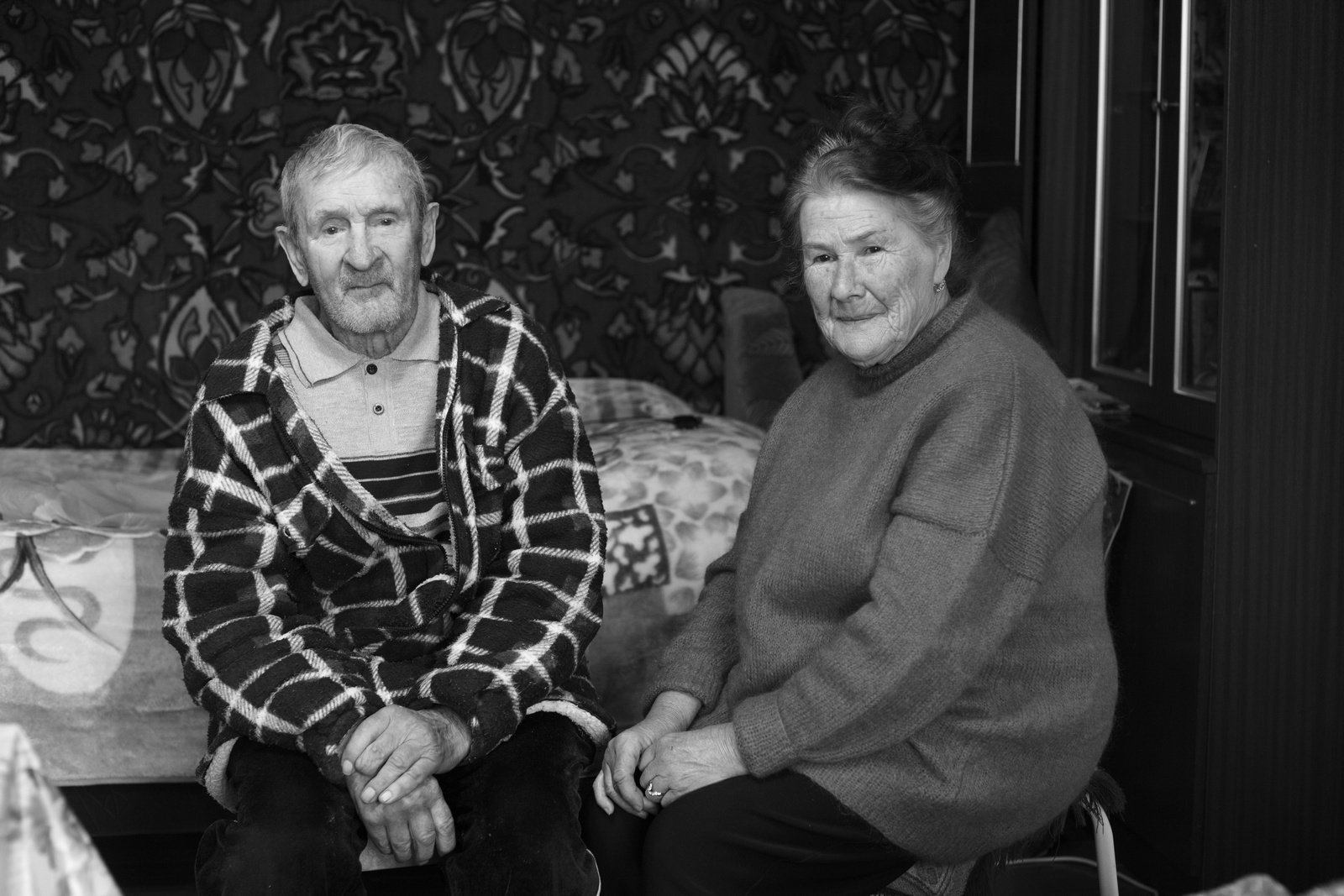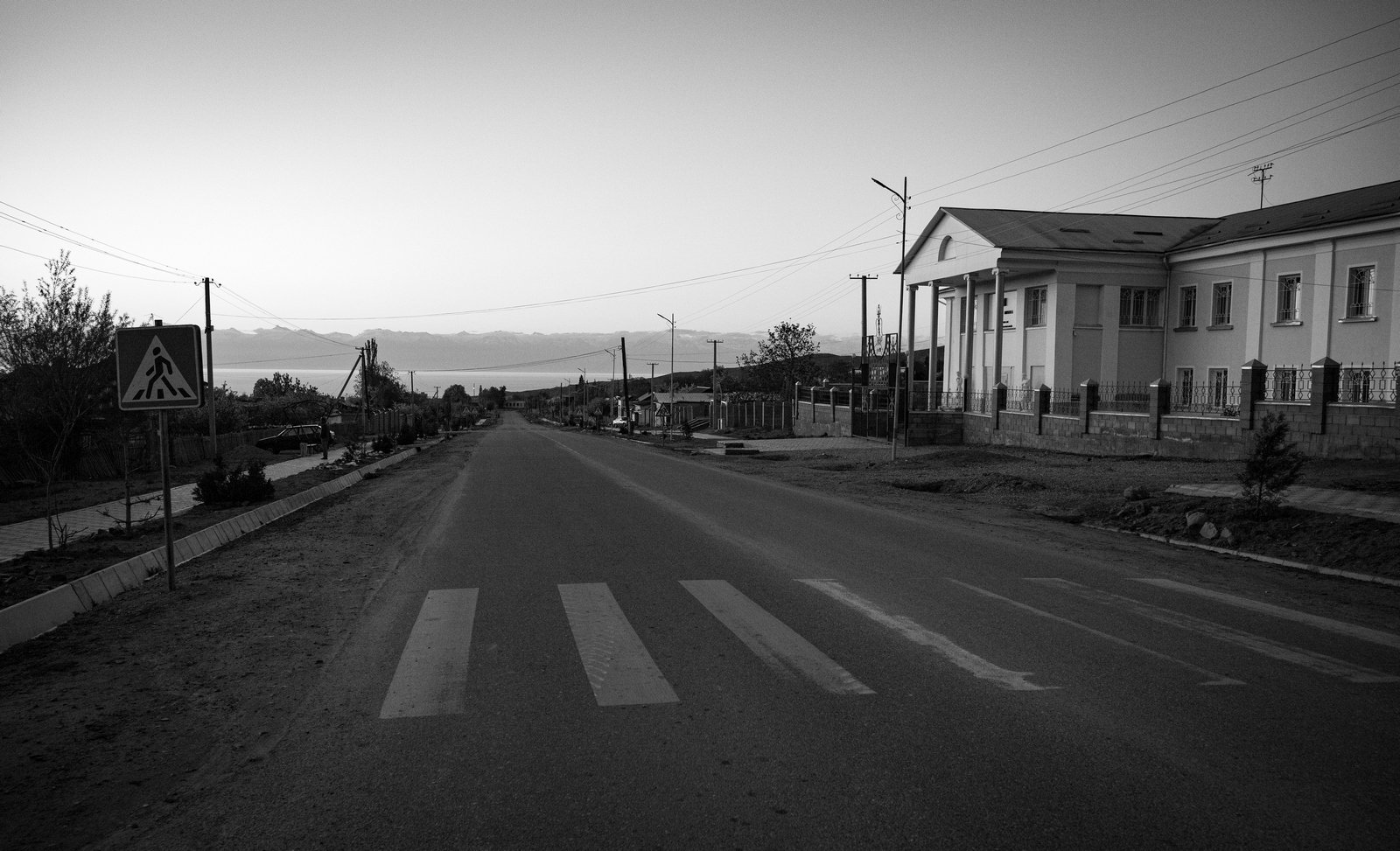Kajy-Say. Life
Bolot Isabekov
.
I have heard of Kajy-Say since my childhood - two of my father’s sisters worked there, one at an electrical factory and the other at a school as a teacher. They always invited me to visit, but it was enough for me to stay where I was, on the north coast of the lake in Tamchy (my family village) and look at the night lights of the south coast, locate Kajy-Say visually somewhere in the distance and send my regards. That was about it.
After graduating, my brother was sent to Kajy-Say to work at a factory there. He told me about the rare clothes, books and other items that one could find on the shelves of small village shops, things an average Soviet man could not dream of finding or possessing. But somehow, I still couldn’t get into those places.
At the Rybachevo (Balykchy) bus station there were buses to Przewalsk, nowadays called Karakol, distinguished by routes: southern and northern. I always used the northern route, I had to go to the village of my grandfather on the northern coast. It just so happened that I could never get to the other side.
Only at a mature age, I drove for the first time on the southern shore of Issyk-Kul, and I was absolutely astonished by the amazing colors, bright landscapes and untouched beauty of these places. I remember the road took an unusually long time, because it was impossible to drive. At all times I wanted to stop and just look at this magnificence.
In 2018, I spent a month and a half filming in Kajy-Say and since then I can not miss two or three months without returning there.
The most fascinating thing about Kajy-Say is the people. They are genuine, native, simple and even slightly naive. Once I met them, it seemed to me that I knew and have been friends with them all my life. There was a time in our lives when people you barely knew would invite you home, try to get you drunk and fed, and they wouldn’t let you go without it.
How delicious are the apples in Kajy-Say! In every yard, when you say goodbye, you are given apples or jam, or even apple pastels. Pastels! You never leave without a gift of some sort. They can even give you a twenty-four kilogram kettlebell when they really want to make a gift. And they are sure to say some simple and kind words. This makes the return home extra special.
I want to shed light about their story, the Kajysayans.
Dyadya Vanya
.
'That is headed to Urumqi,' said Uncle Vanya knowingly, as he hid away from the Sun and gazed at the plane in the sky.
We walked with him towards the gorge leading to the upper valley above Kaji-Say, from where the water supply comes to the village. Meanwhile, I was reminiscing about the time we first met.
On one of the filming days in 2018, I found myself at a three-story house, next to which one of the scenes of the film was to take place. I was standing on a hillock, right in front of the house, in case someone accidentally got in the shot.
And right before my eyes there was a wonderful picture: on the balcony of the second floor a towel was drying with the inscription "60 years of the USSR". And if it weren’t for the neighboring windows all sealed with boards, I’d think it was the '80s.
A peaceful and nostalgic picture.
I couldn’t help but photograph this balcony without noticing a man standing behind me. We exchanged greetings, he asked what we were doing, I told him about the filming. I wanted to take a picture of him as well but he refused and left.
Three or four months later, while I was going back to Kajy-Say, I was looking for a guide for my research. I was advised to contact a local ethnographer whose surname was Rodionov. They said that he organizes excursions for tourists, shows local attractions in the area and in his breaks, works as a taxi driver and stands at a roundabout in the center of the village.
When we met, I immediately recognized him as a passerby outside that house with a hanging towel and what left me in awe was that it was his apartment.
That’s how we became friends with Ivan Nikolayevich Rodionov.


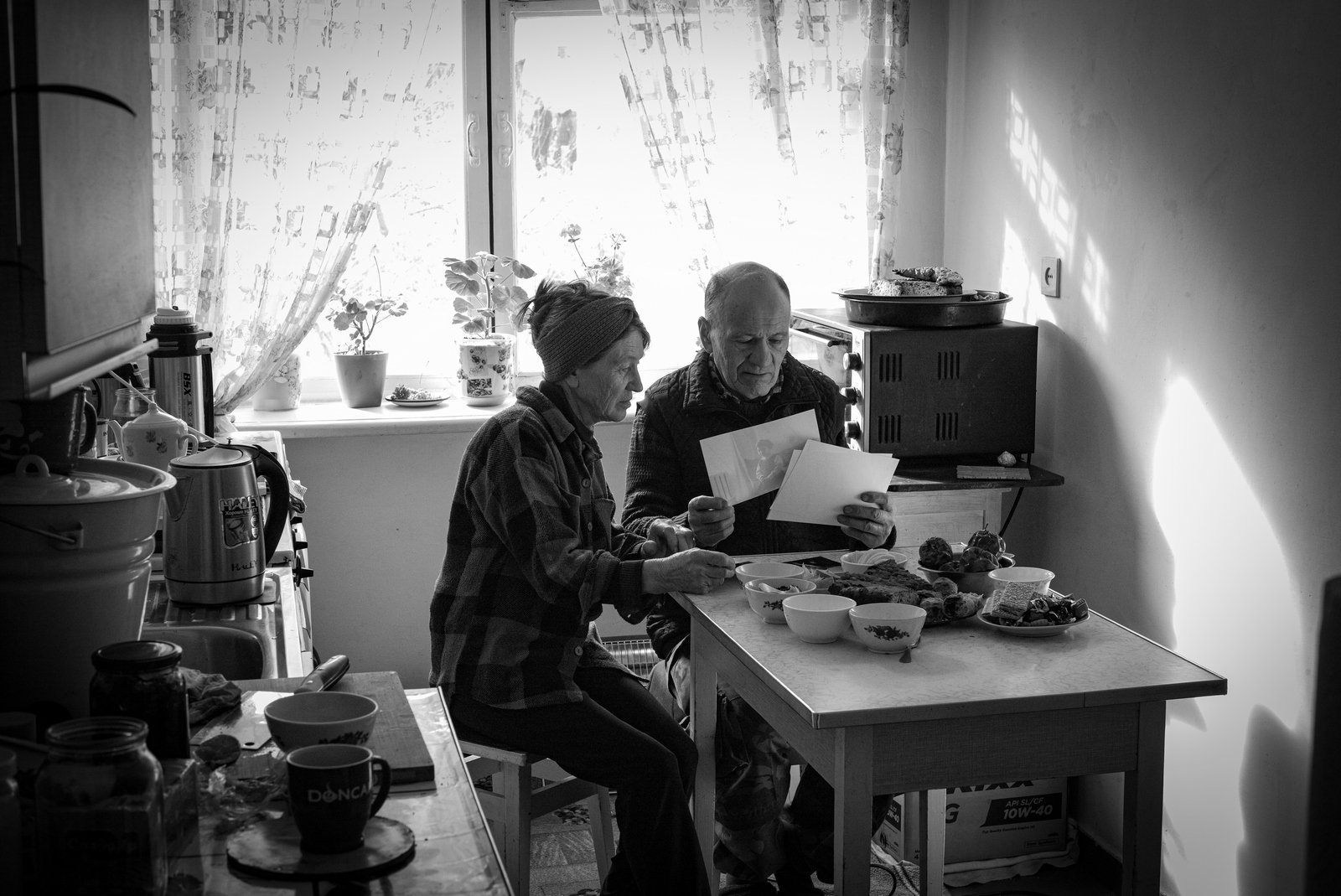
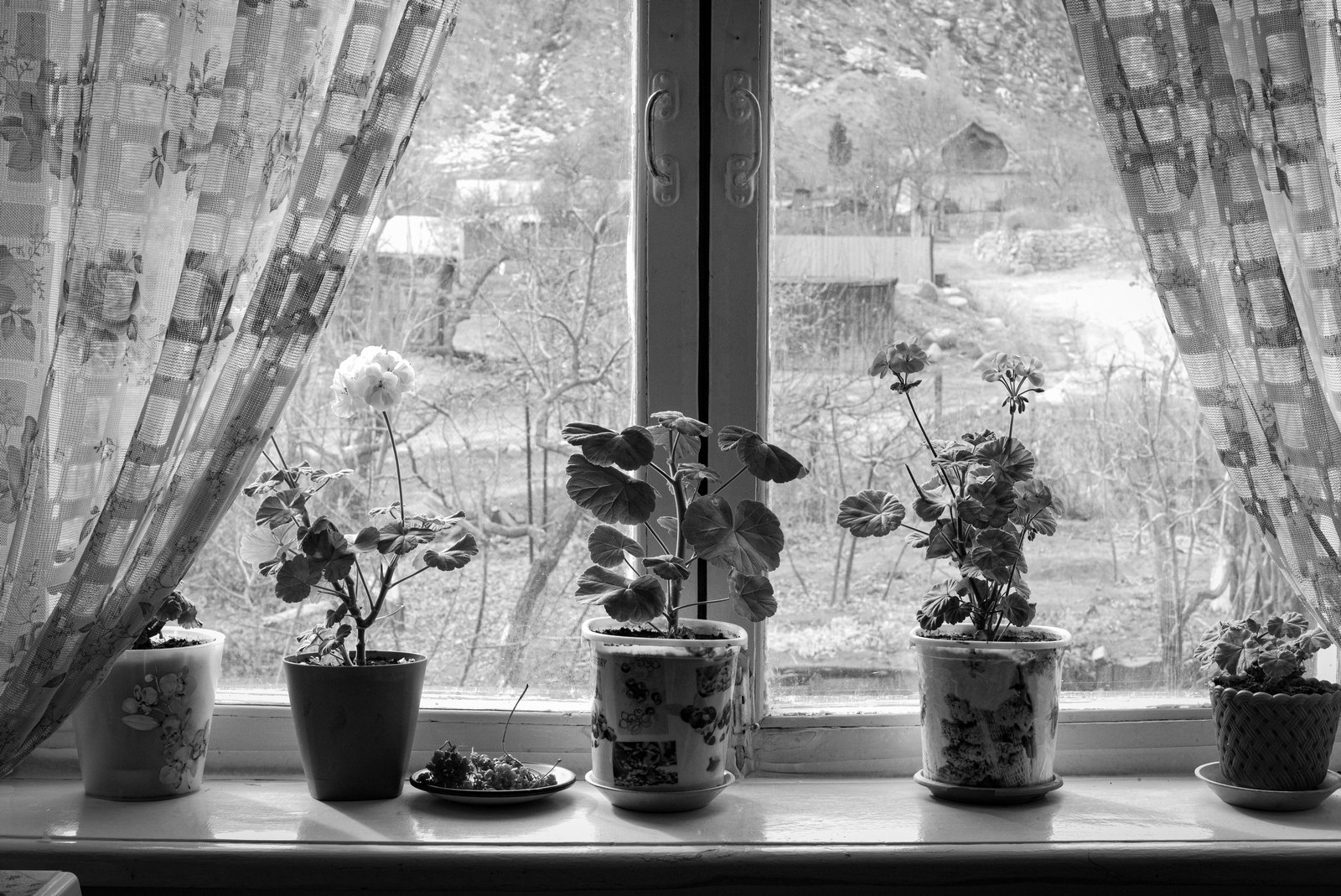
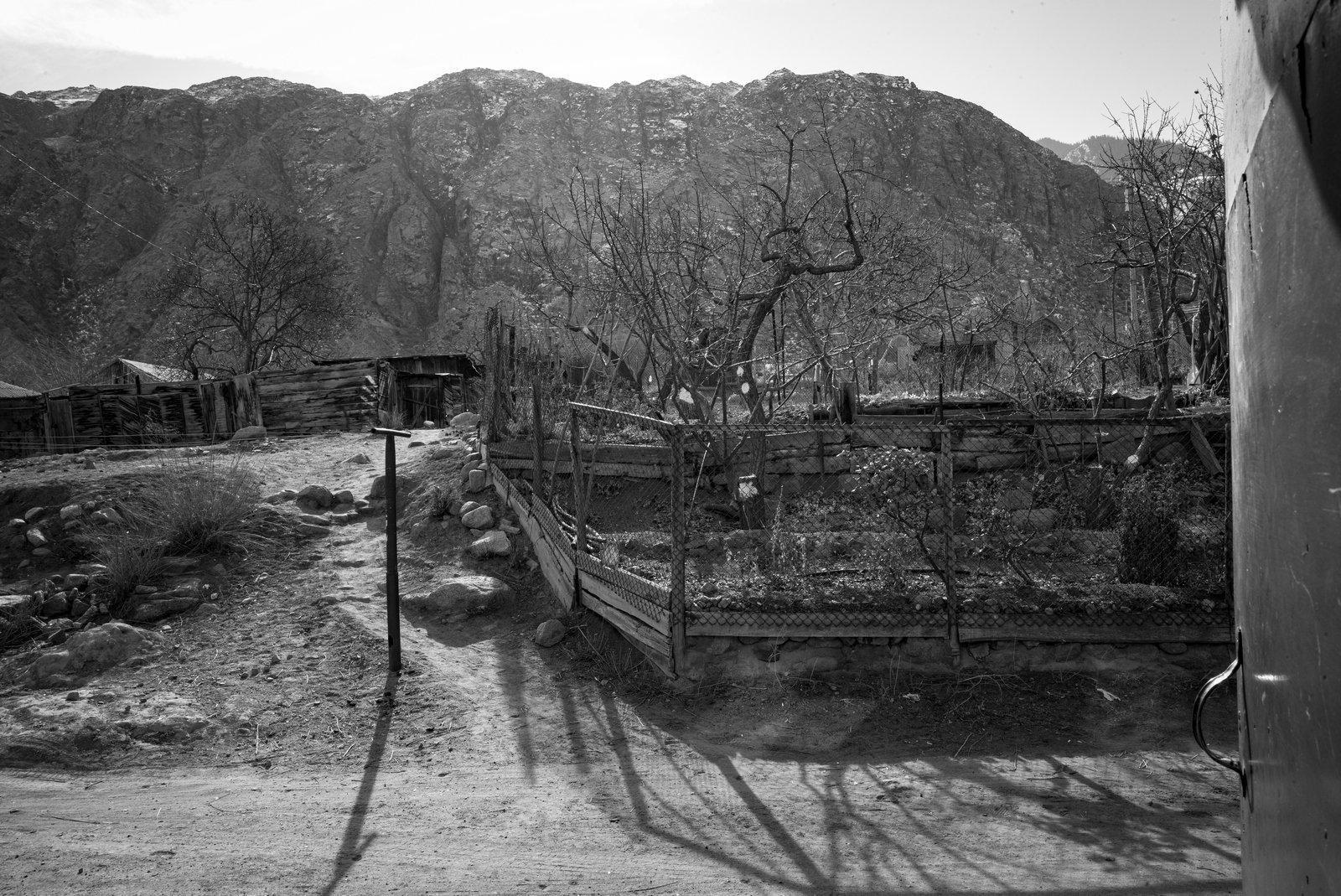
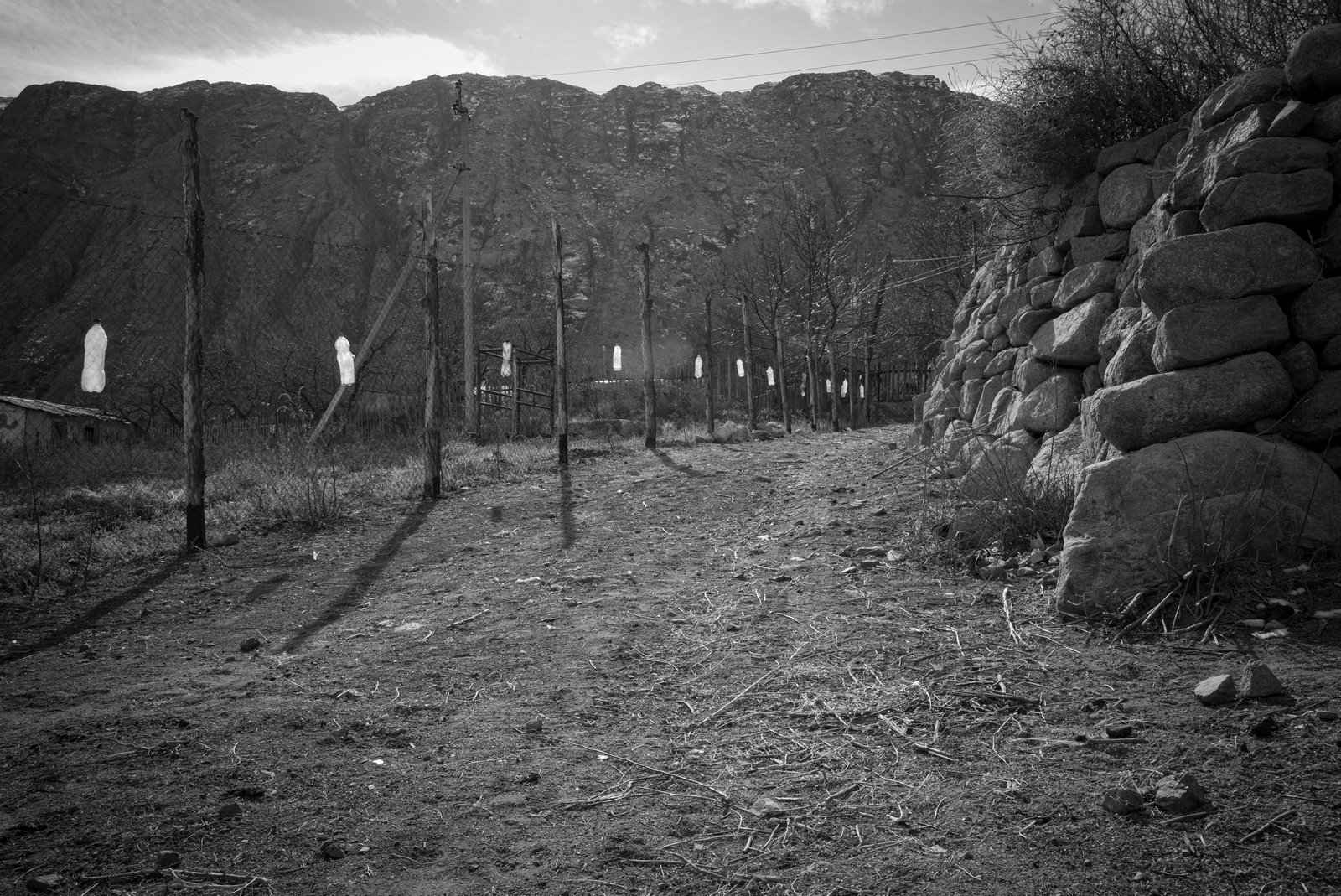
In this bright apartment, Tanya, the wife of Ivan, does everything to preserve the warmth, cleanliness and coziness. Every morning they have breakfast together, discuss the latest news, and then Uncle Vanya takes care of his daily chores around the house and the garden: bringing firewood, coal for the stove, feeding the dog in the garden and managing the household.
For the last three years, he has to manage all those things before lunch, then he goes to the house of his mother who is 97 years of age. She lives alone after the death of her youngest son and needs full care. Ivan feeds her, takes care of her and sleeps at her house. He is constantly afraid that his mother will fall and hurt herself. Every following morning, he returns to his home, to Tanya. And that’s his daily routine.
“
When I go to my mom’s house, she usually has the TV on. I yell out loud: "Mom!" She’ll tremble, then start smiling and then she says: "How nicely you pronounce that word - mom.
"
Earlier, in addition to Uncle Vanya’s pension earnings he organized and led excursions for tourists, including foreigners. After the beginning of the pandemic, with the closure of the borders, the number of tourists in the village went down drastically and Uncle Vanya has almost no clients.
While doing research on my project "Palimpsest. Kajy-Say", I had to spend a lot of time at "Promka", as the Kajy-Say people call this place, where the mine ore management administration, the hydrometallurgical plant, later the electrical plant and the mining headquarters were located. I was interested in the places that saw the very beginning of the development of uranium mining, the first mines. I collected any information about the people involved in this production, about how they worked, in what dugouts they lived in. Ivan Nikolaevich was my constant companion, thanks to him, I saw all the first mine shafts.
Uncle Vanya studied many documents related to the atomic project. Some of the decrees in which the mine management administration №8 was discussed, Ivan could repeat by heart.
“
Everything here was classified. It was forbidden to say the word uranium. Instead, they used the term "A9". The village was not immediately named Kajy-Say, at the very beginning it was called "Vosmerka"(Eight).
- Ivan Rodionov.
"
“
You know, this town was built by romantics. Everything here was special: the only village club with a real orchestra pit, central heating, the best hospital in the area and even monuments of lions, just like in Saint-Petersburg.
And when we finished classes at school and walked along the road of Issyk-kul, we could not see the sky, hidden by a dome of leaves and branches of poplar trees, growing on both sides in three rows.
Do you remember Mayakovsky’s "I know the city will be, I know the garden will bloom…” ? It’s like Kajy-Say.
"
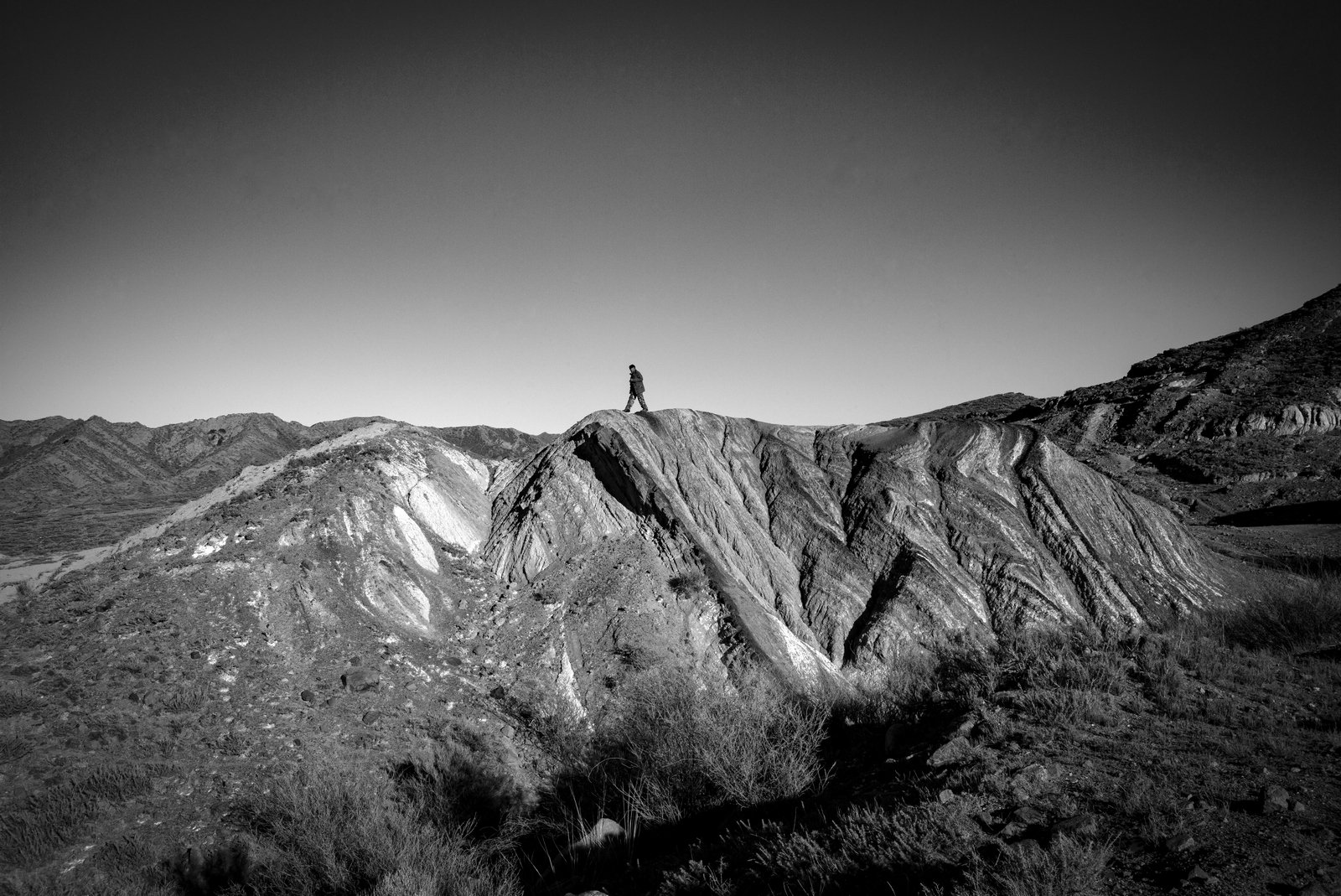
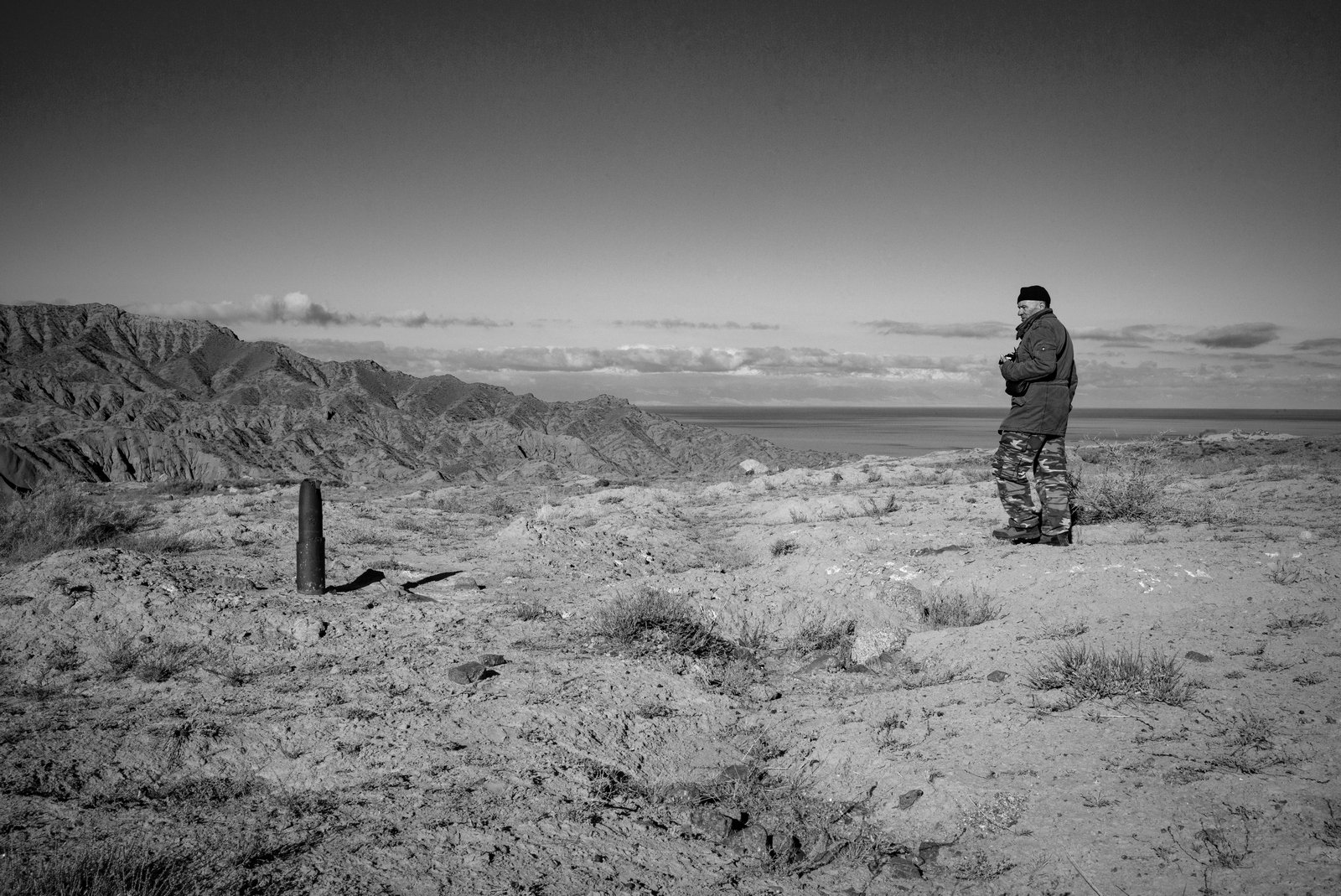
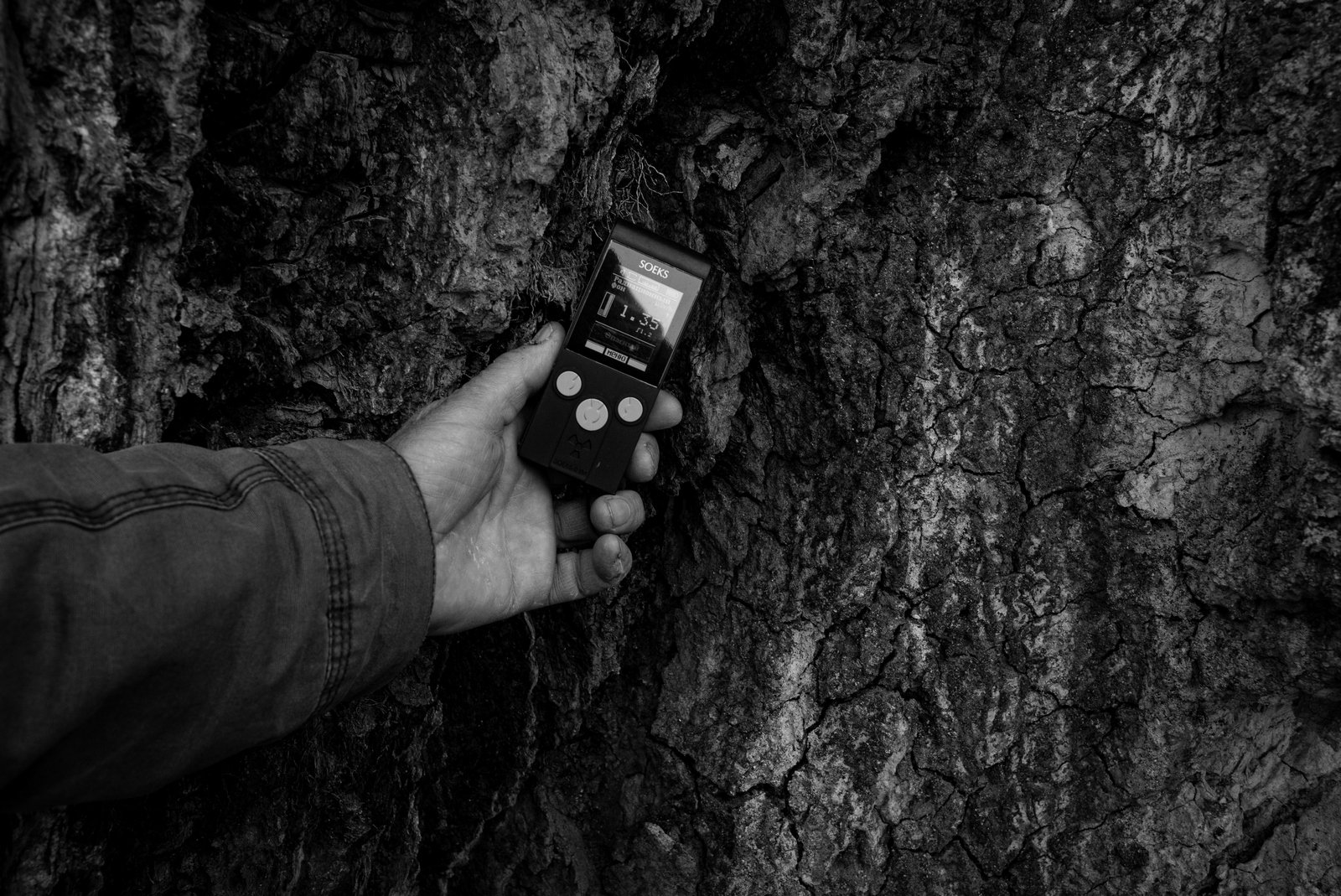
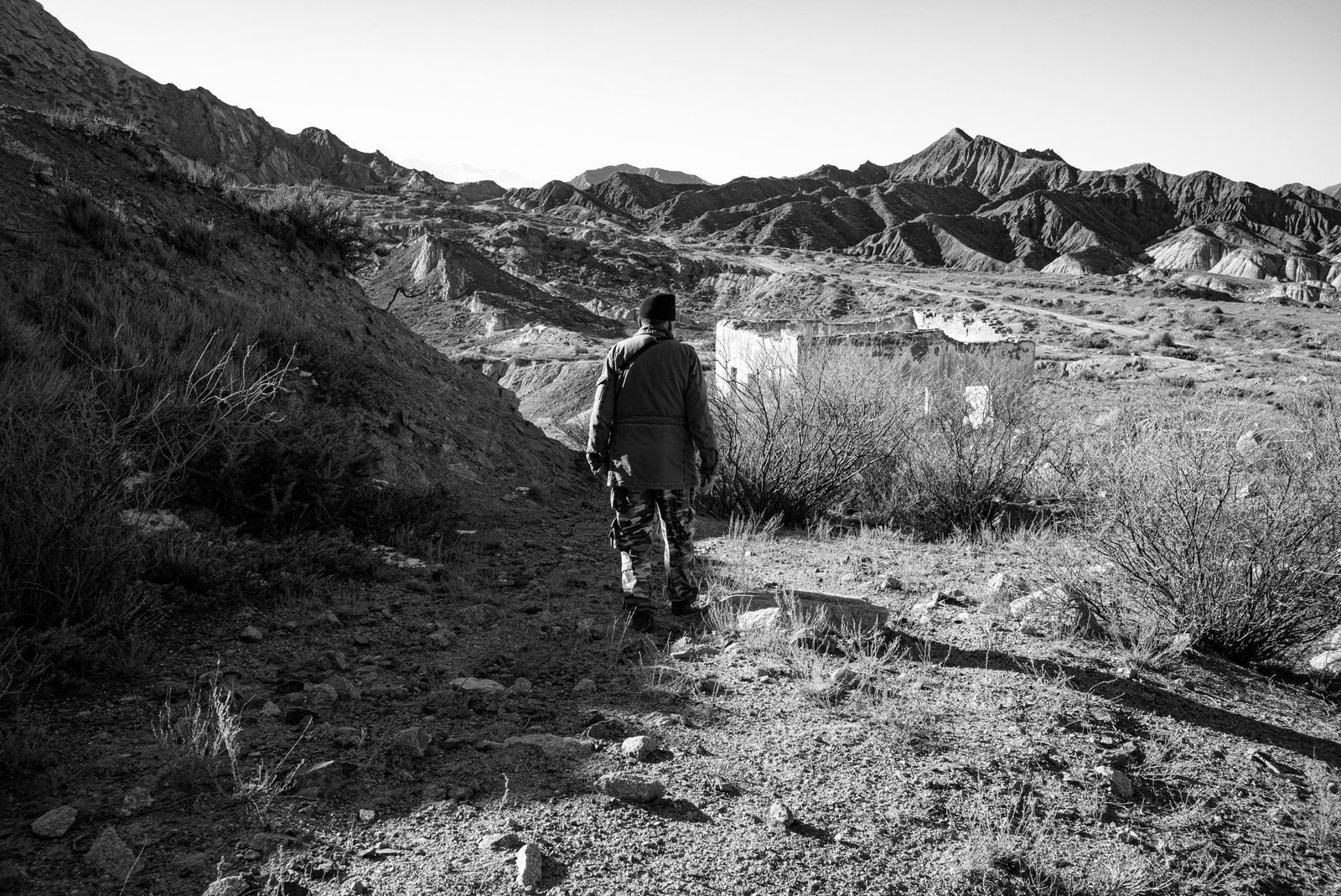
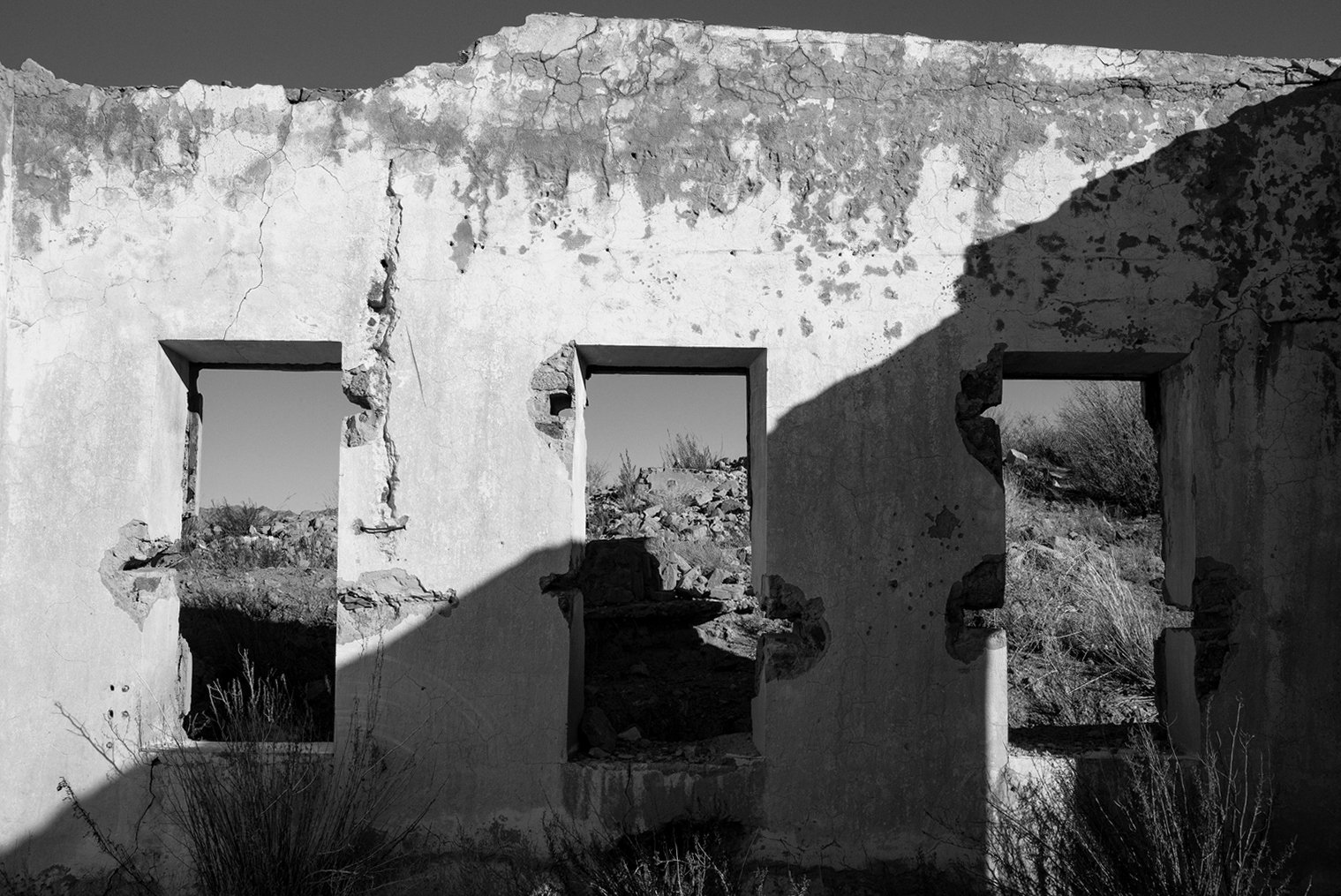
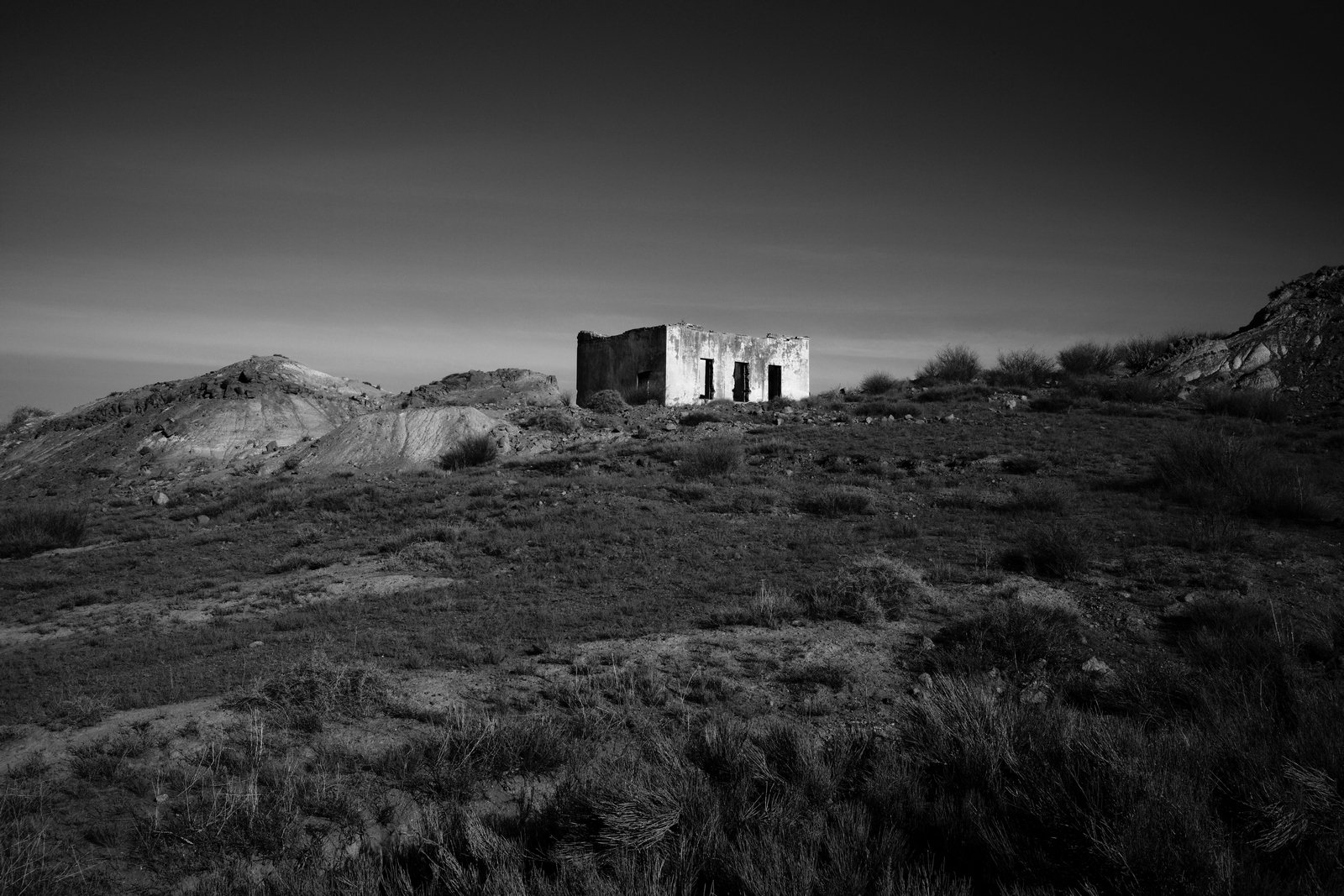
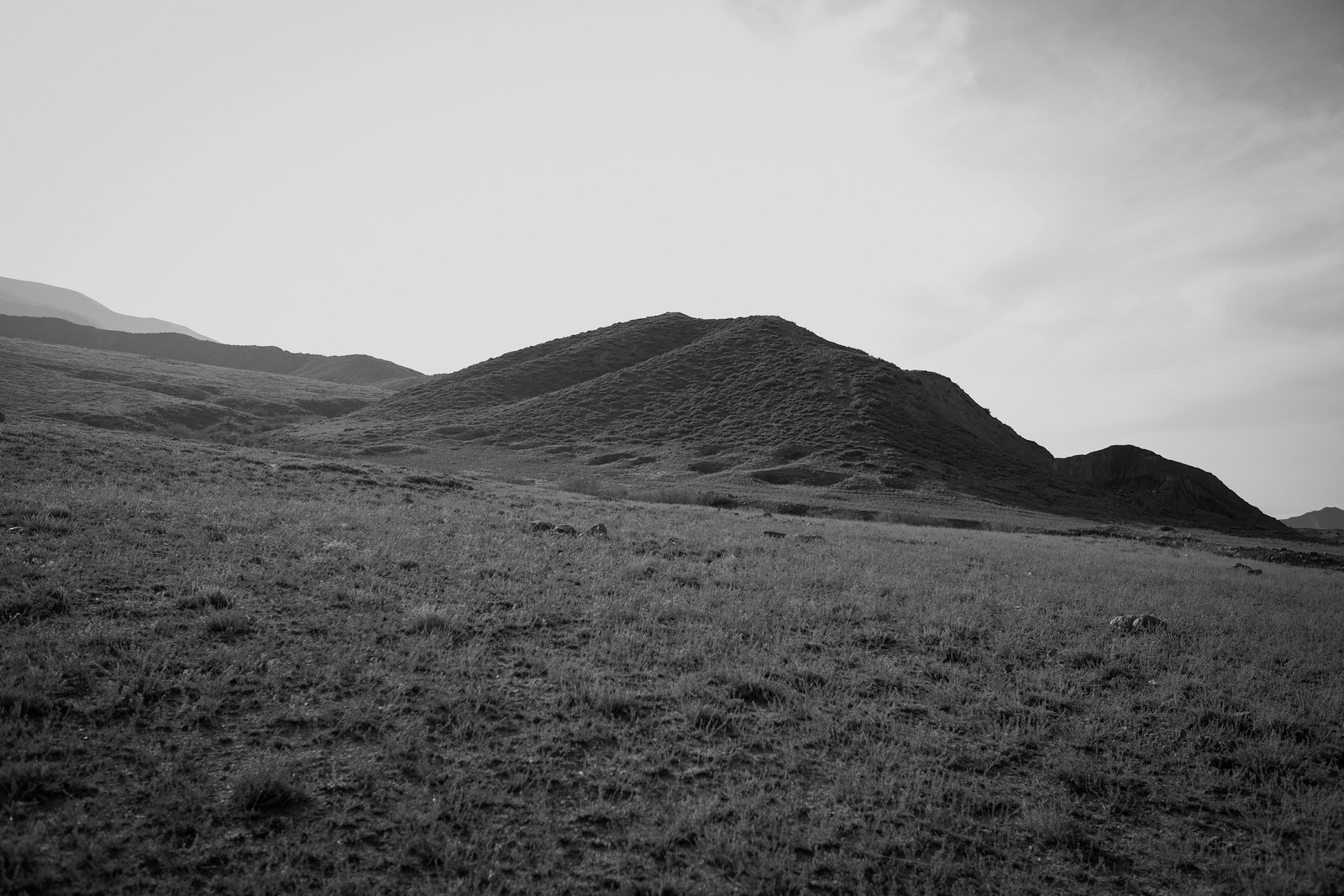
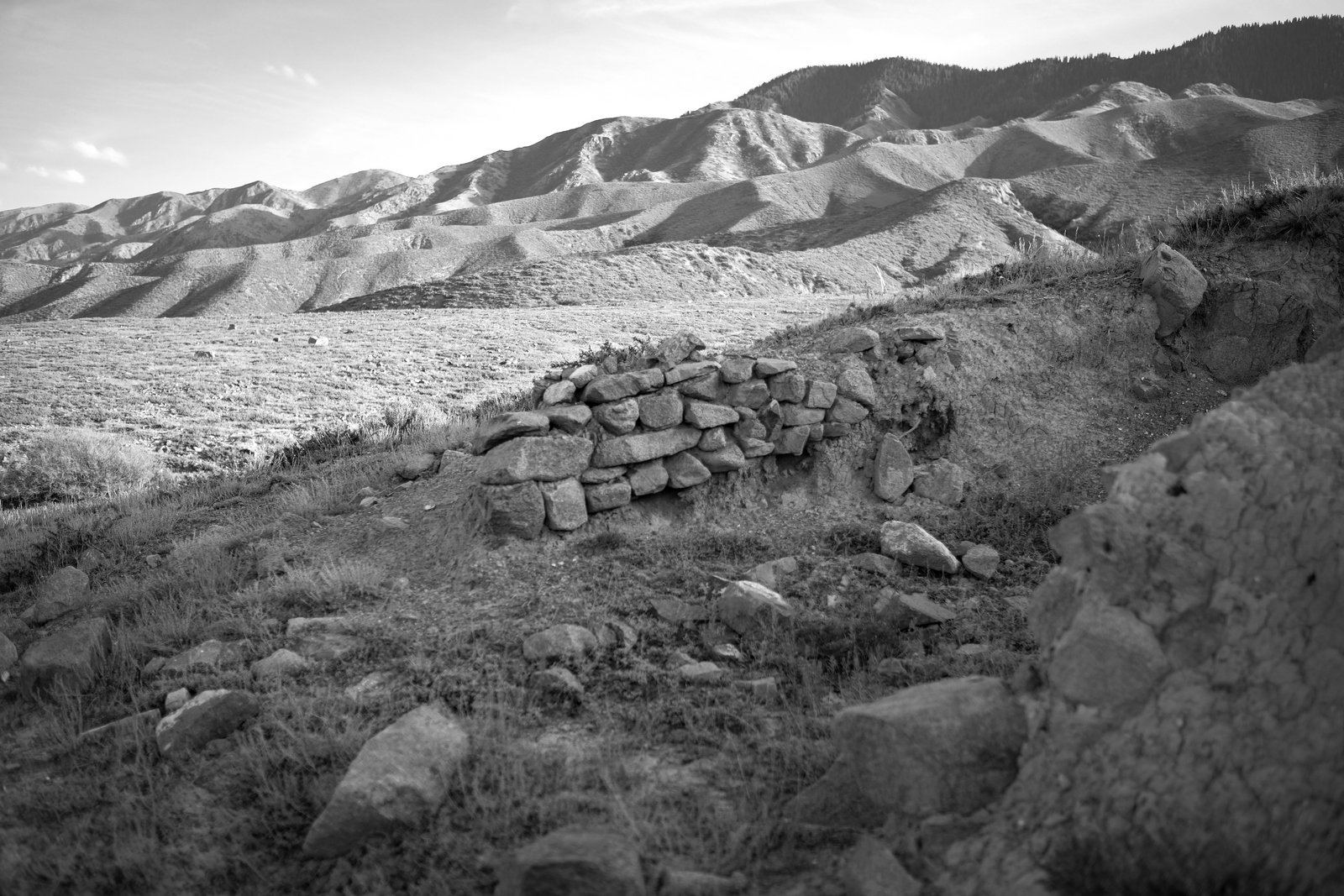
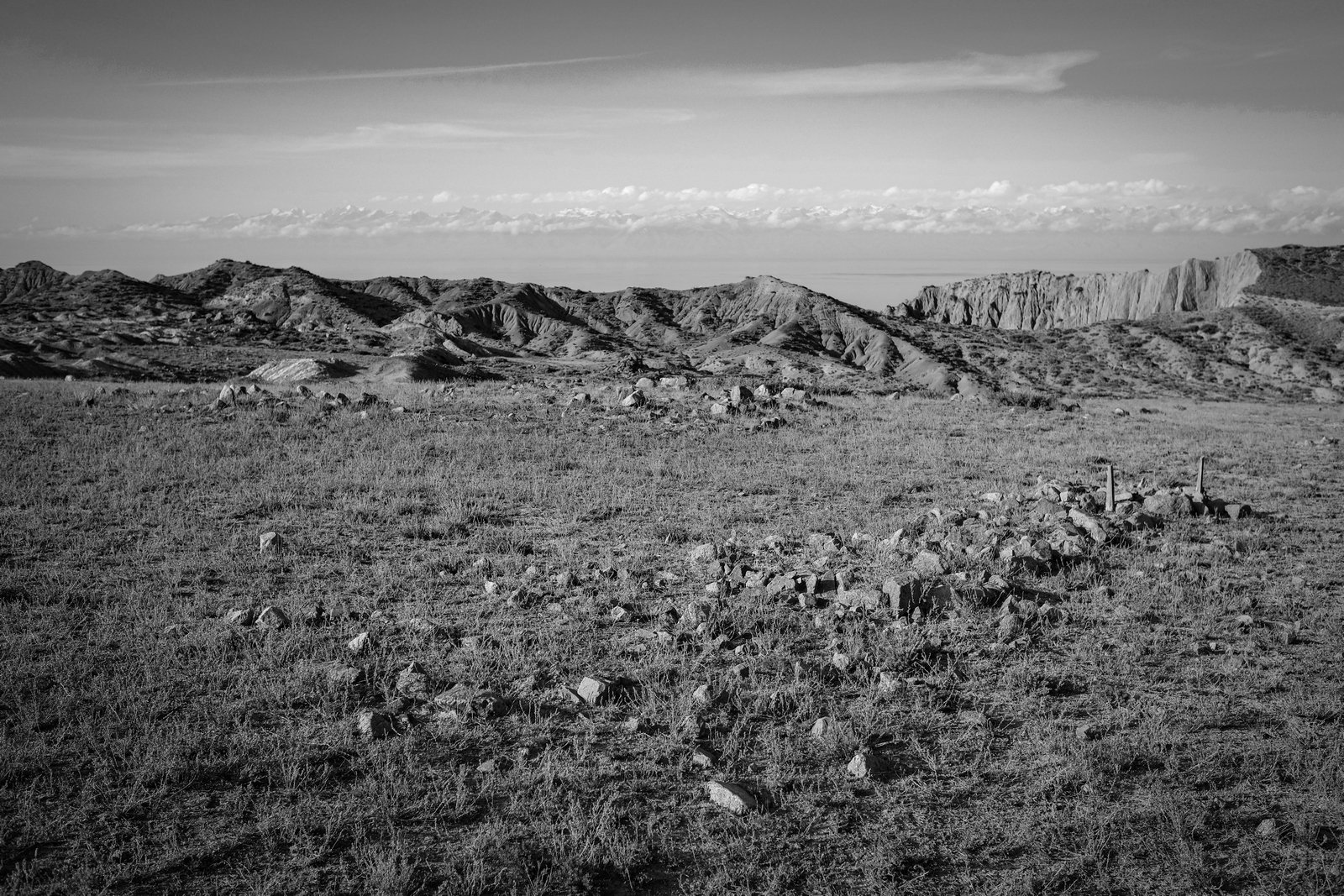
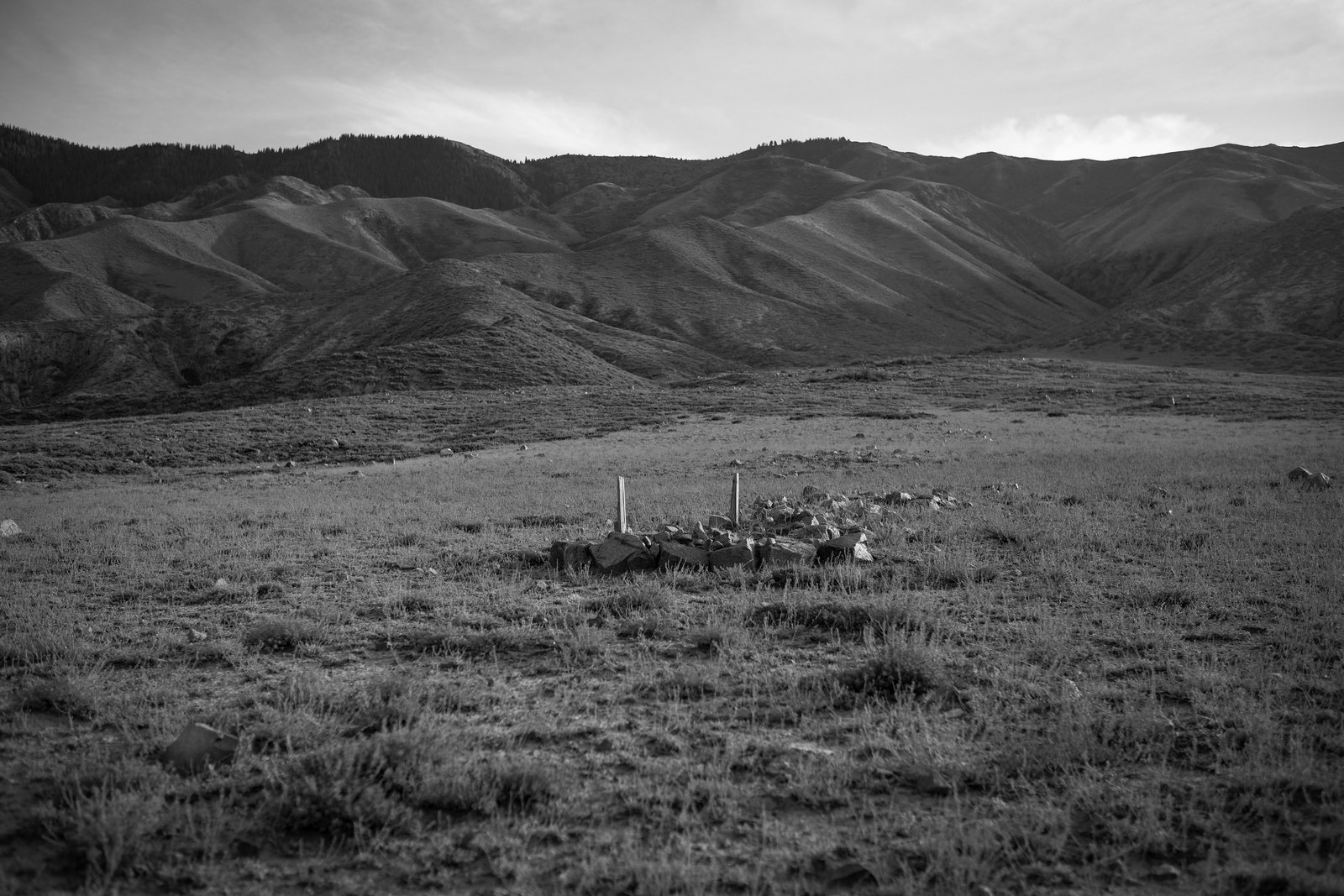
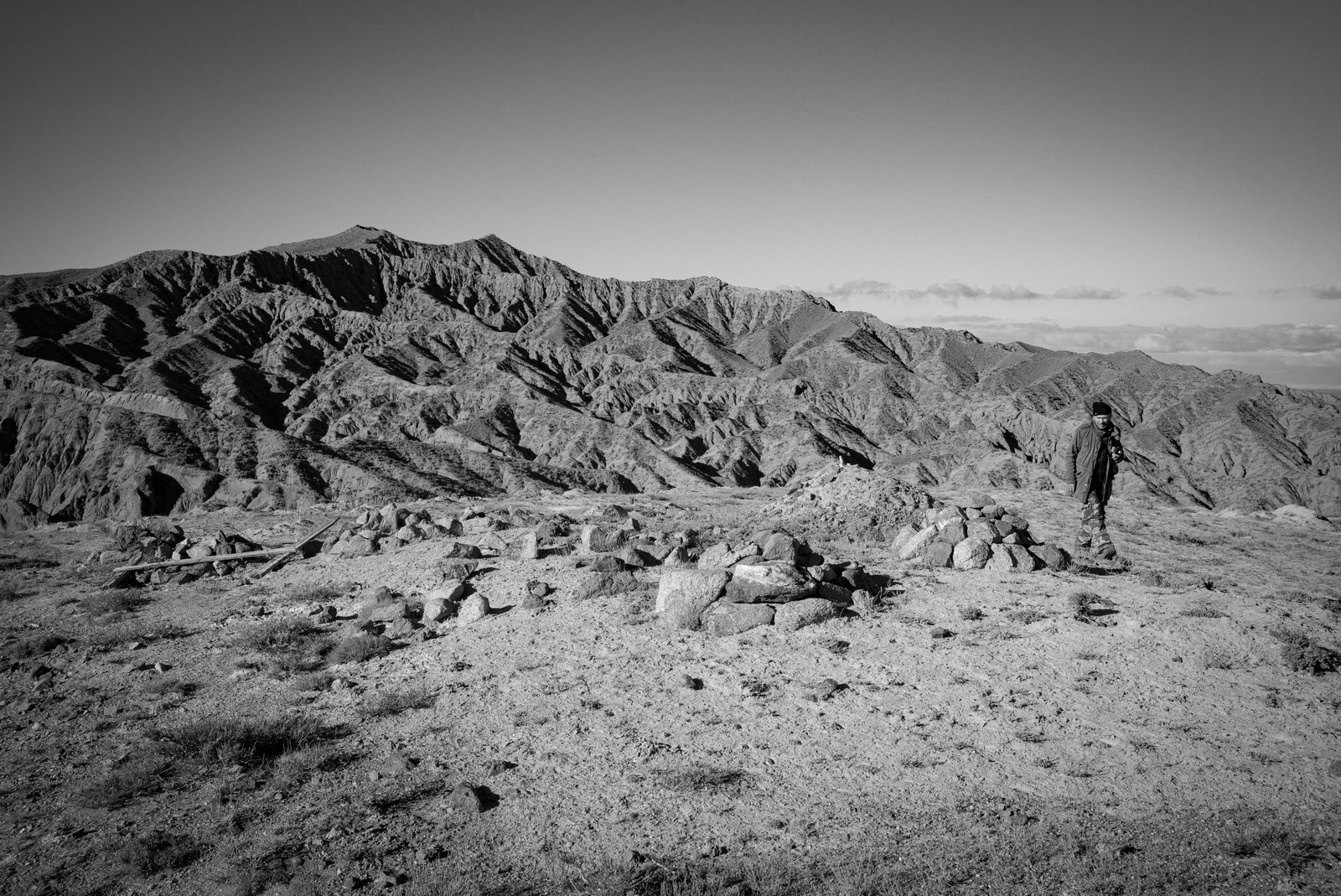
“
After getting a job in the village, my parents bought a mud hut for a hundred soviet rubles. I came later, I was six years old. In the hut we lived for the first three years. Then we moved to a Finnish prefabricated house, where my mother still lives.
When I went to school, it was already named “Lenin”. And prior to that, the school was named after Laurentia Beria. It was named so in honor of his services in the implementation of the Atomic Project of the USSR, which ended in a successful testing of the atomic bomb.
It is difficult to imagine the price of a real labor feat of the first builders of the mine: geologists, engineers, workers. Having no access to proper machinery and equipment, they began construction almost by hand, using shovels and pickaxes.
"
Tatiana Vladimirovna, spouse of Ivan Nikolayevich
She graduated from the Przewalsk Medical School. In Kaji-Sai she worked as a nurse in the ambulance service of the local hospital. For some time she worked at a mine shaft in a medical post, and then, when it closed down, at the Kaji-Sai department of narcology, which took patients from the entire Issyk-Kul region.
Their relationship is touching and sweet. They met, traditionally for their time, at the dancefloor. Uncle Vanya affectionately calls her Tanyusha.
~
Nadya and Miron
.
“
All my childhood I spent in Kajy-Say, you can say from birth. My parents were geologists and worked in mountain settlements all the time . After my birth, my parents lived in Sary-Jaz, a mountain village. Two years after my birth, my brother was born. My bond with Grandma and Grandpa was very tight, sometimes Dad, when leaving his parents back to Sary-Jaz, couldn’t take me with him. I crawled under my grandmother’s big bed and cried. Eventually, my dad would leave me here. But when I turned 5, my brother was then 3, everything turned upside down. My dad lost his life in a car accident. After that, I was left at my grandparents', they raised us. Mom, as I said, worked all her life as a geologist, spending all her life in the mountains. It was hard for her and was impossible to take my brother with her. Therefore my grandmother also took my brother for upbringing. She and Grandpa always worried that we wouldn’t feel like orphans and they were successful at it. Childhood was warm, bright and filled with love and care.
- Nadezhda Lee
"
Nadezhda (also referred to as Nadya) works as an English teacher at a school in Kajy-Say named after A.S. Pushkin.
Dmitry Andreevich Lee, Nadya’s grandfather, worked as a chief mechanic at a coal mine shaft, and his wife, Nadezhda Pavlovna, also worked there, but in a training center, she taught and for some time worked as a master at the mine shaft.
___________
“
Every morning Grandma would wake us up, and we would run for our morning exercise . Then we would always have a cooked breakfast and after school we would always have lunch.
What else I remember distinctly is the New Year parties at school. Grandma was very handy at everything she did, cooking - this is only one of her many skills. She sewed beautifully, and here she was self-taught. She bought every issue of «Burda Moden» magazine and made fashion outfits for herself and mom.
But going back to my New Year’s Eve parties, for every feast, my grandmother sewed me dresses. I was a Snowflake, a Note, and a Princess. But the most memorable outfit was the Korean hanbok dress that my grandmother made me out of flags, and I don’t even remember where we got them from. That morning I won the prize for the best outfit - Senegalese checkers.
"
___________
___________
“
Grandpa was an avid fisherman. Many said he had some sort of secret feed, he always caught many times more than the fishermen sitting in boats near him. In the summer, often we as a family went to the lakeshore very early, at 5 or 6am in the morning, grandpa inflated the boat and swam so far that it seemed like a small dot. Grandma always cooked food for us while we played and waited for Grandpa. In the evenings, already knackered, we were just sitting with my brother on the lakeshore and looking at Grandpa, awaiting his return. By the way, when my brother grew up, grandpa taught him how to fish and took him on a boat from then on.
"
___________
___________
“
The village then was very busy, crowded. During the holidays, it was a tradition, Grandpa gave me and my brother a collectible iron ruble, (Grandpa collected them, and he had a piggy bank, he only saved white coins), and we happily ran to a shop where you could buy a lot of tasty things. I still remember the taste of the ice cream.
Another bright memory - a trip with Grandpa to the cinema. The two of us went to our House of Culture cinema! It was so great that we were together. I still remember the title and the content of the film - it was an Indian film «Thirst for revenge». Feelings and emotions at that moment overflowed.
- Nadya
"
___________
Miron is short for Mirzagon. That’s the way Miron likes it, he’s been called that since high school, and a lot of people don’t even know that his actual name sounds different.
Miron met Nadya when she was studying at the university in Bishkek. Miron’s family worked in their cafe at the university.
___________
“
Once I was invited to a disco, a good company, and Nadia came that day, too. We’re standing there, and at that moment, the band’s song, Mr Credo, "Let’s Make Friends"...
This is our song. After that dance, we became friends. We were going out for two years before I proposed.
- Miron
"
___________
When Nadya’s grandmother died, Miron and her eldest son came to Kajy-Say to sell the house after the funeral.
According to Miron, they needed some time to stay and get the house renovated before selling. But after a month or two passed by, they realized they didn’t want to leave.
___________
“
You know, here it's like this, you walk down the street, you meet your neighbors: "Where are you going? Why? To the store? What are you going to buy? Buy me something too, if you're going to the store."
It's very different in the city now. You arrive, you call, and you get the answer: "Hi, how are you, I'll call you back." And you're like, "Why call me back, I'm right here talking to you..."
I was like them too...
It's different in the city...
"
I became friends with this family four years ago when I was making a film in the village. Nadia and Miron’s eldest son, Daniel, appeared in episodes, and Miron was always ready to assist in the preparation of the film’s various scenes. One episode featured Miron’s pigeons.
Friendly family of Egamberdievs. That year the youngest daughter Sitora was born.
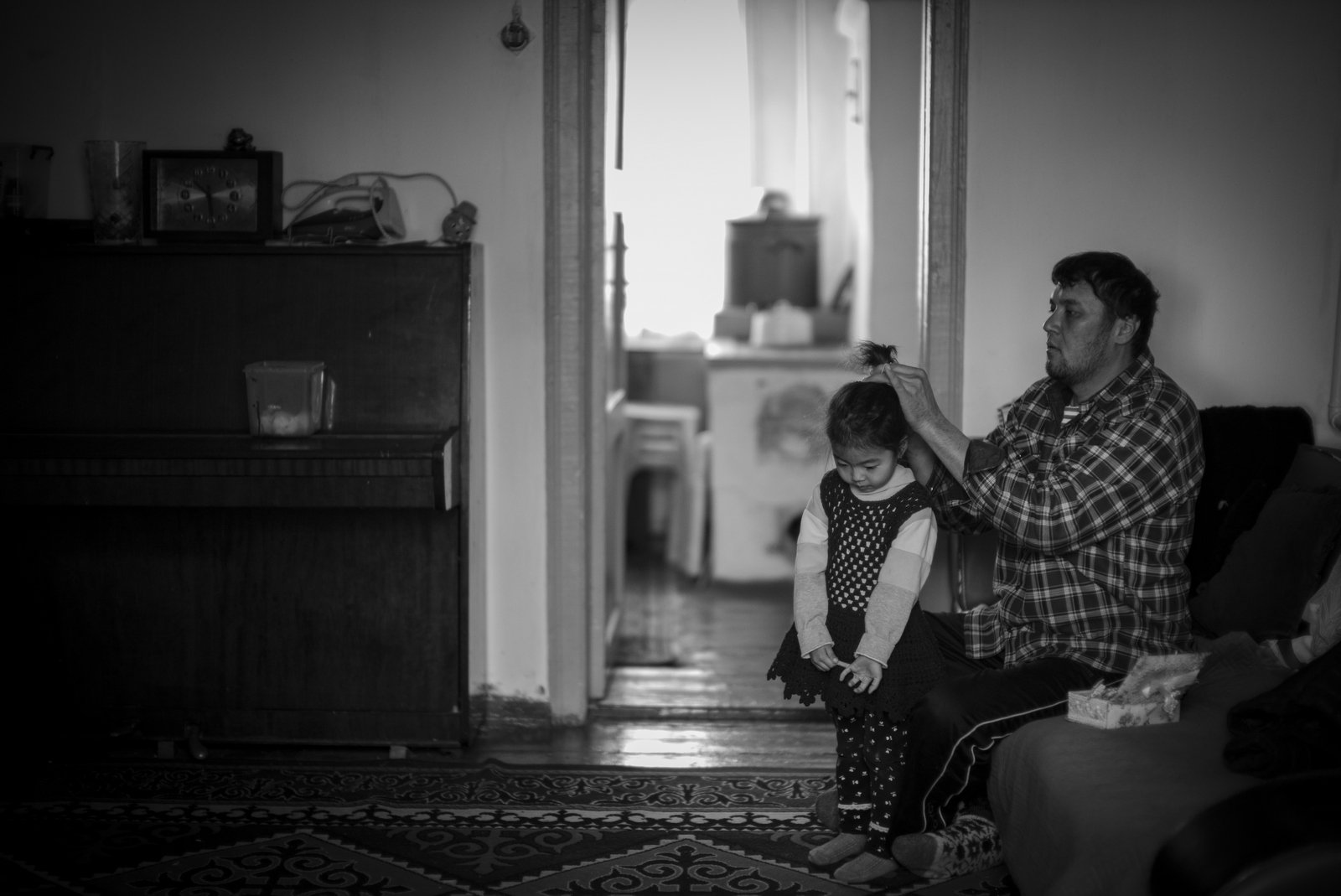
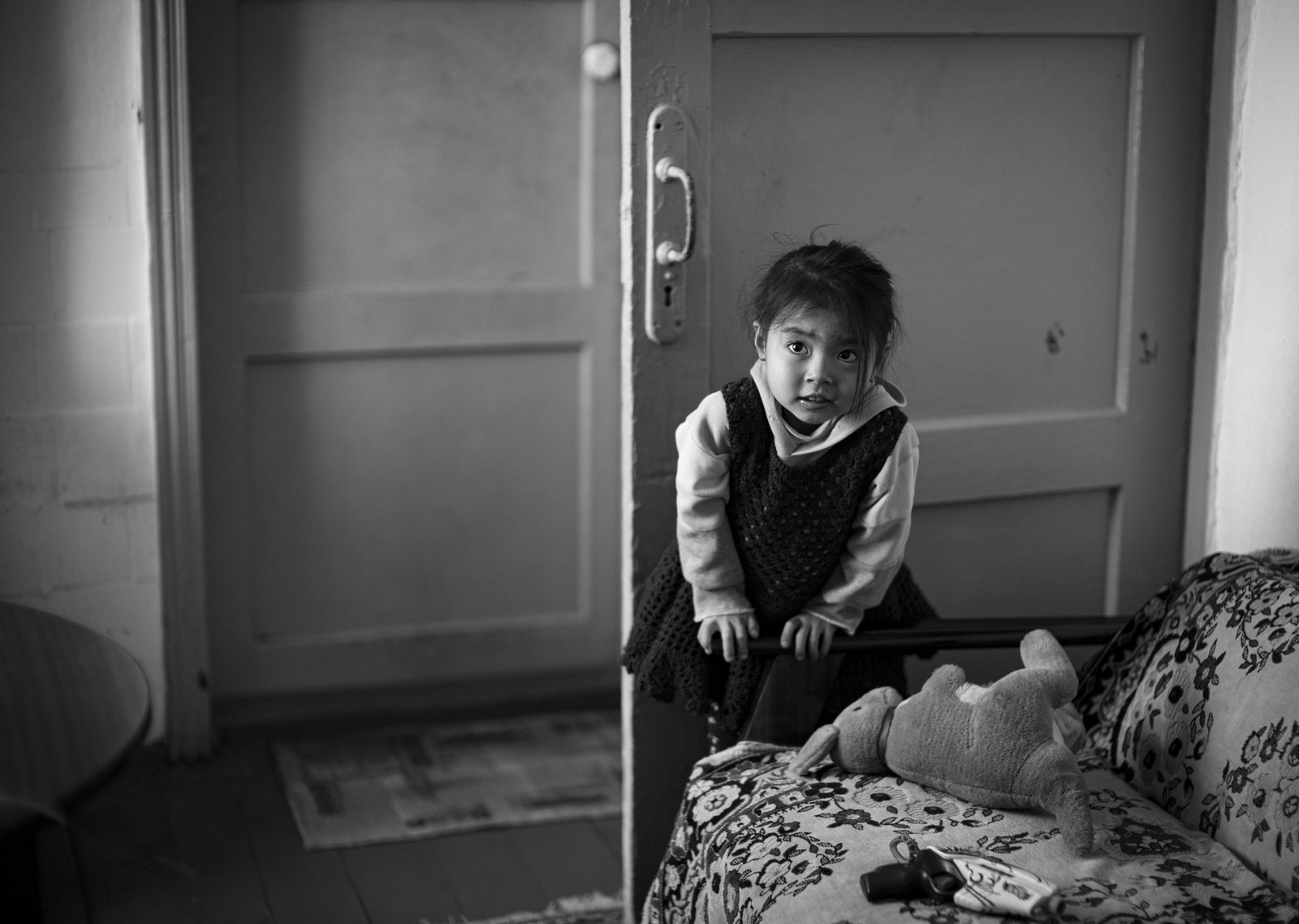
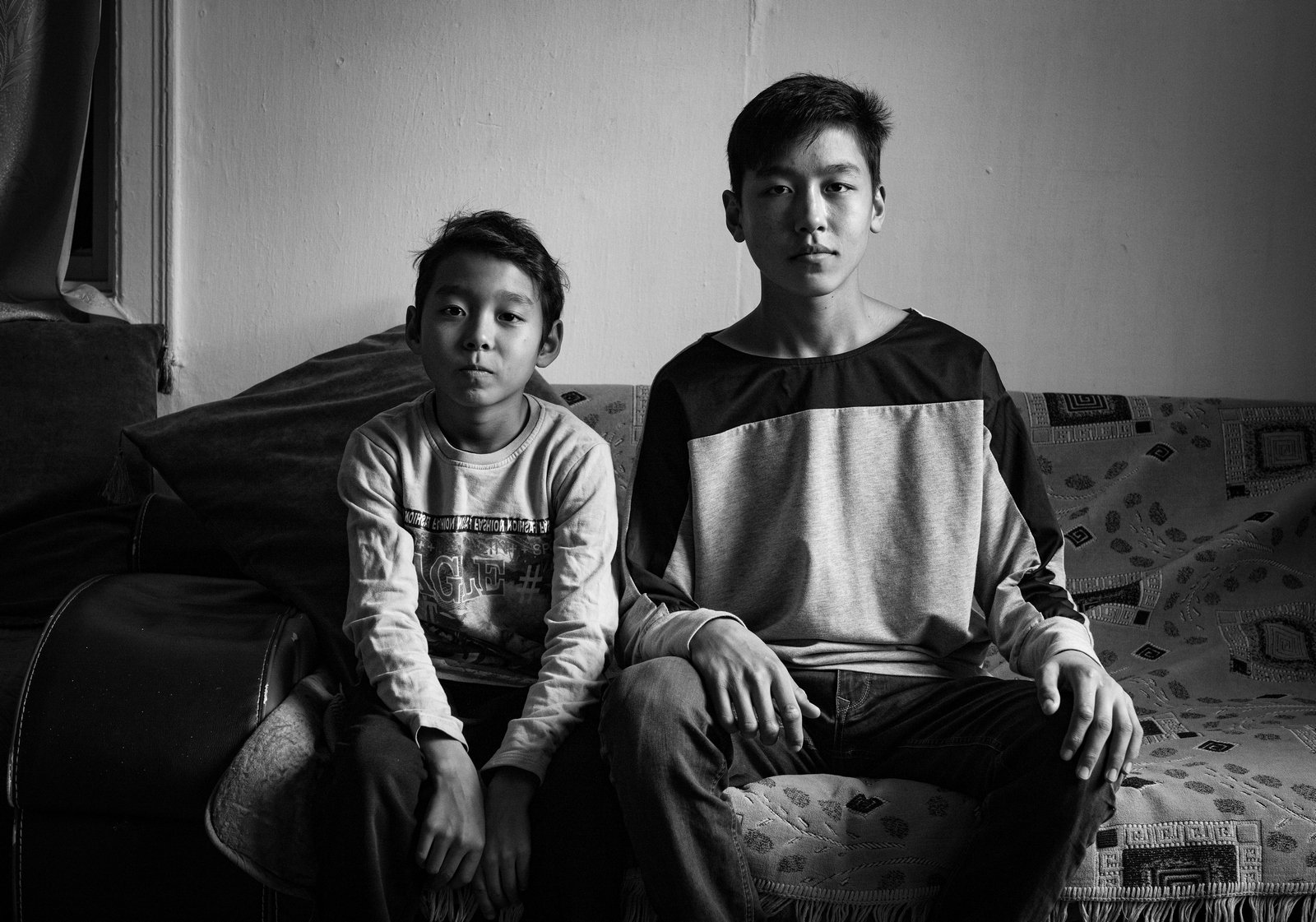
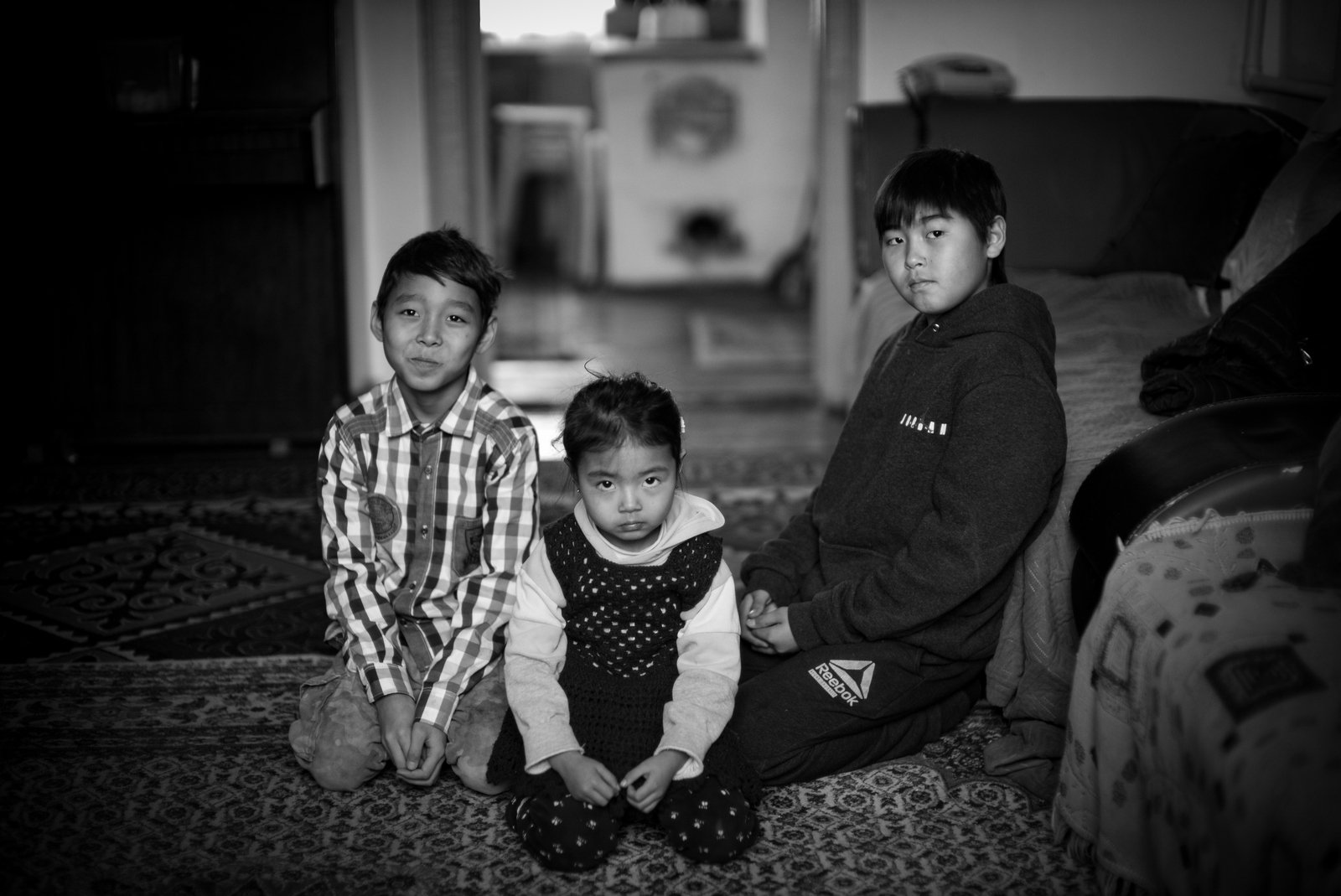
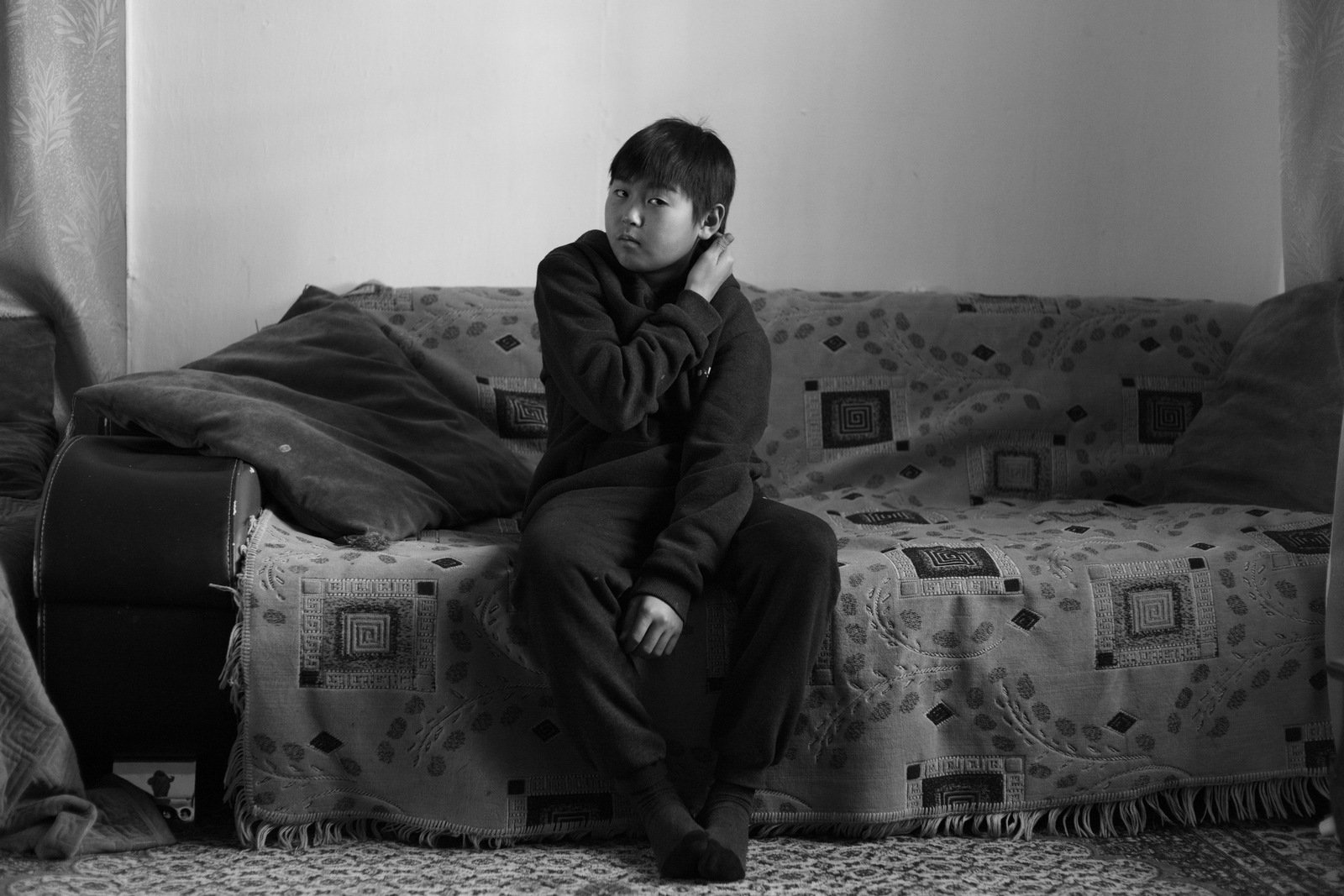
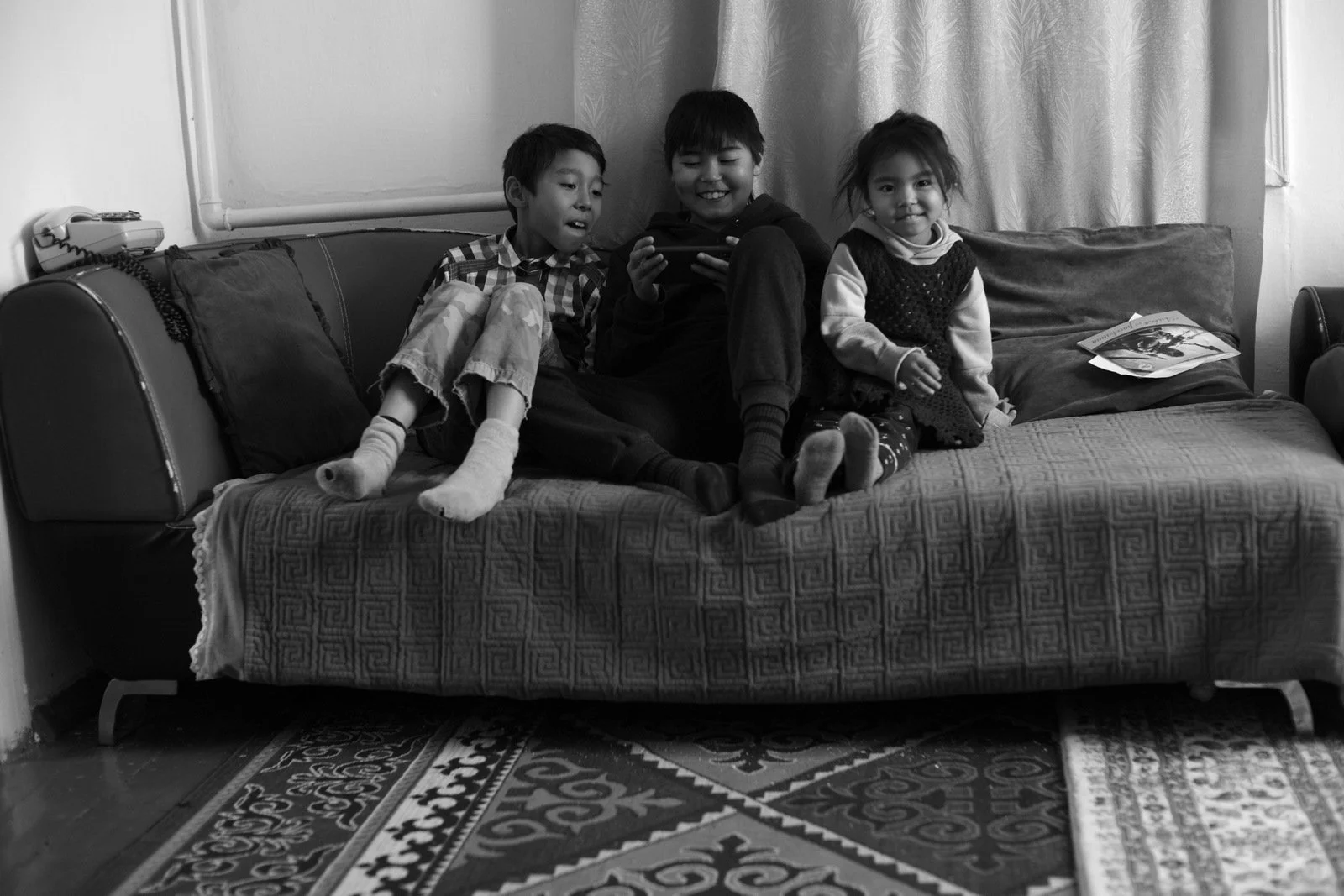
Miron is engaged in the education of the sons, and Nadia takes responsibility for the daughter. Miron says that he spoils Sitora. He named her after Sitora from the KVN Asia-Mix team. She will grow up to be beautiful and smart.
Grandmother’s cooking was very tasty, many still remember what a cook she was. Family holidays, birthdays were remembered fondly. Grandma very carefully prepared for each event. I still have her notebook with recipes, which, by the way, I also use. Grandma made a menu that included five or six salads, and even a hot and delicious dessert. But! The main thing is always a very warm company, soulful songs and chess!!!
Grandpa played chess professionally. We keep his chess board as a memory.
The backbone of any town, city, country - young people and young people 30-40 years. As long as they are, there is a future here...
~
Alla Semyonovna and Edik
.
That's how I first saw him on one of the streets of Kajy-Say.
- My name is Edik.
- And what’s your full name?
- Just call me Edik. Over there, in the club, I used to dance there. Folk dancing, ballroom dancing too... I once climbed on the grand piano in that club, jumped off the piano onto the stage, and went off...
Eduard Petrovich, factory worker, lover of dancing.
Alla Semyonovna Alekseeva, her maiden name is Nikolskaya. The wife of Eduard Petrovich.
She worked at the electrical factory as a foreman and as an assistant of the master.
“
I’ve always been serious. When my dad was having family meetings, I was the chairman. Not my elder sister, I was.
"
___________
“
My dad’s a native Moscovite from Sokolniki. In one tv program, Lyov Leshchenko, the singer, once said: "On our street in Sokolniki the merchants lived on one side, and on the military on the other.
My father is from a military family and he served in military all his life. He met my mother in Pokrovka (Kyzyl Suu) when he served in Frunze. My older sister Lilya was born there.
Then he was transferred to Yakutia, Nürengrinsky district, where I was born in 1944.
Apparently it’s a very beautiful place there now. Back then there was just a village...
My dad took me and my mom out of the hospital when I was born, drove me home on reindeer sledges, and went to the front.
"
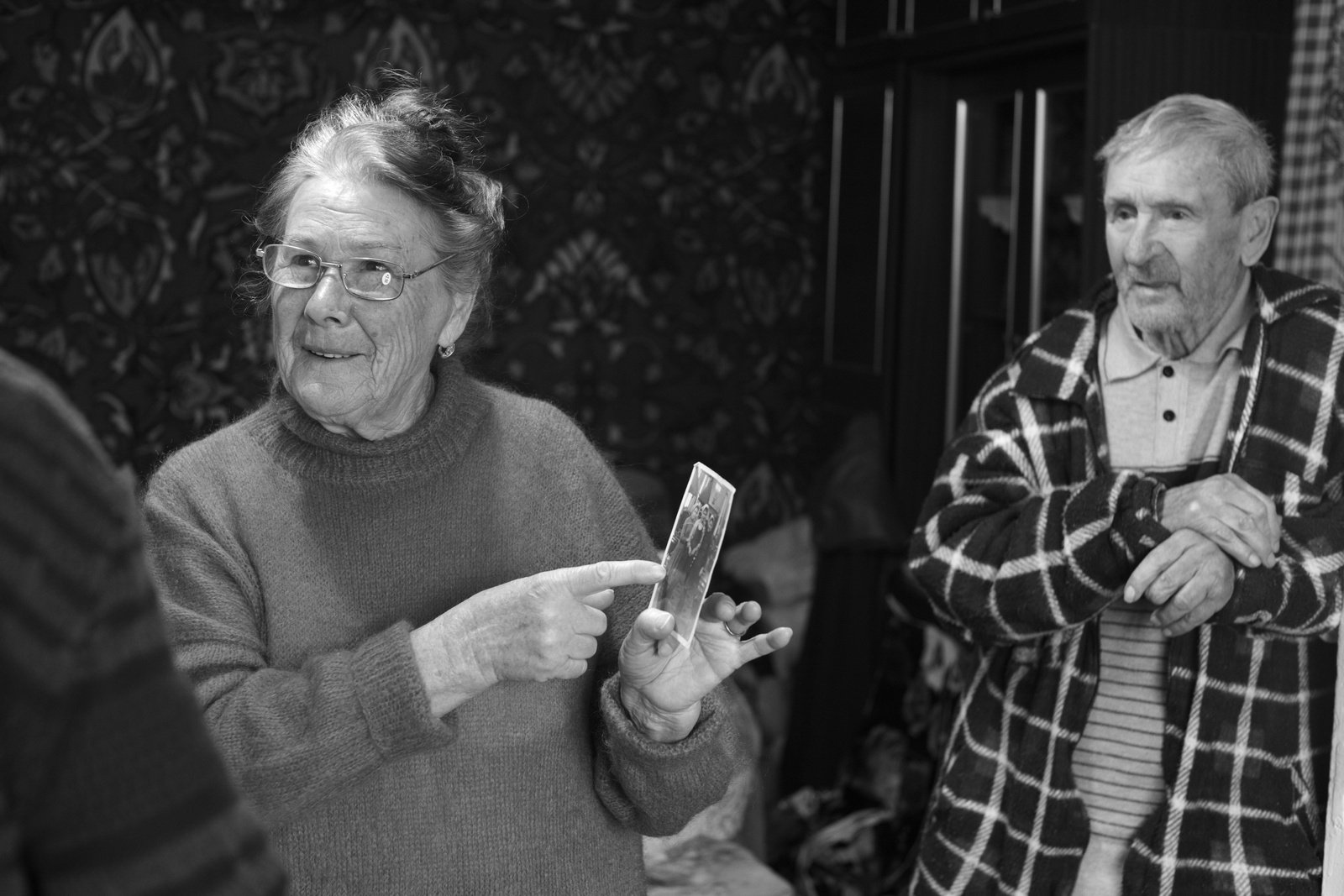
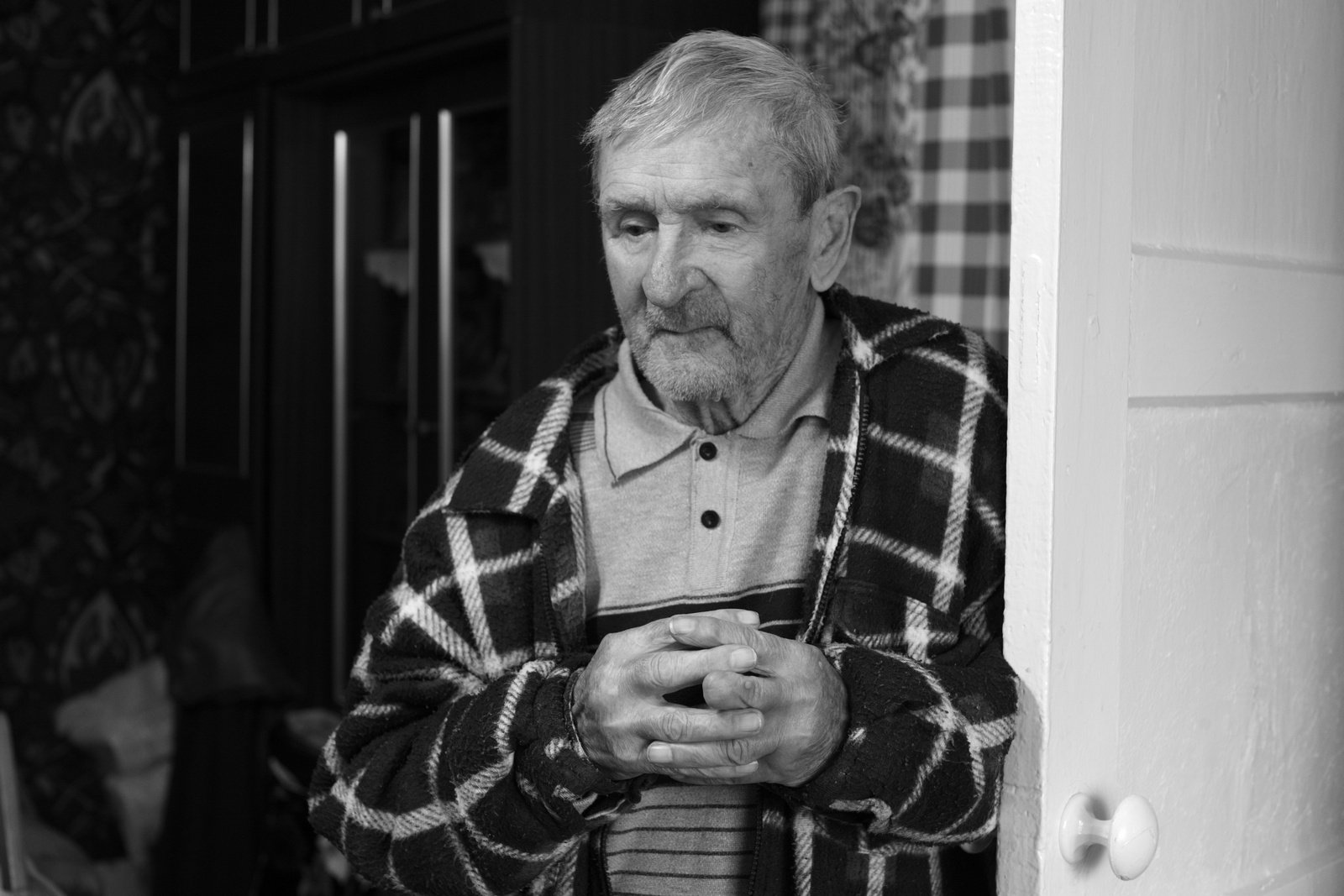
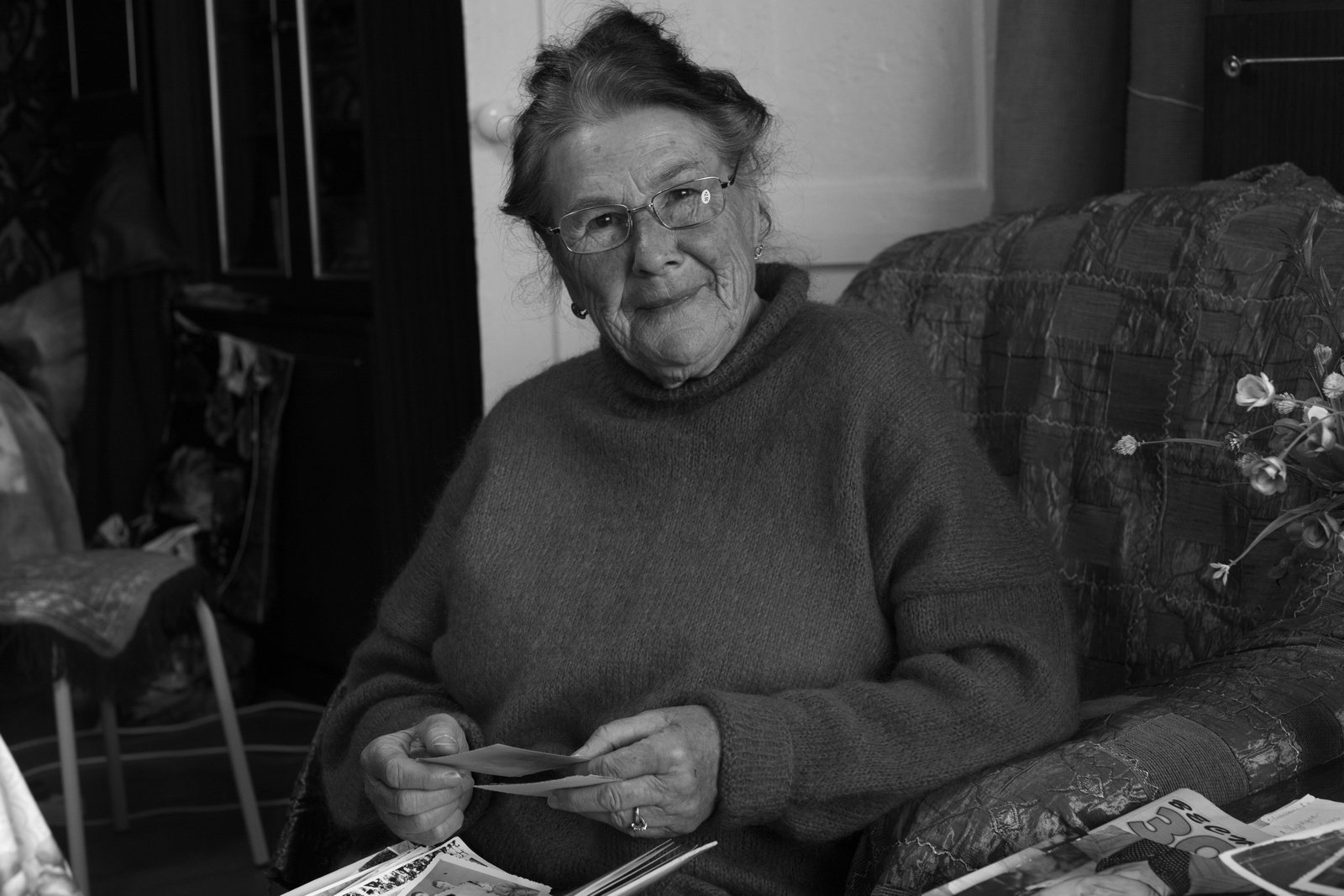
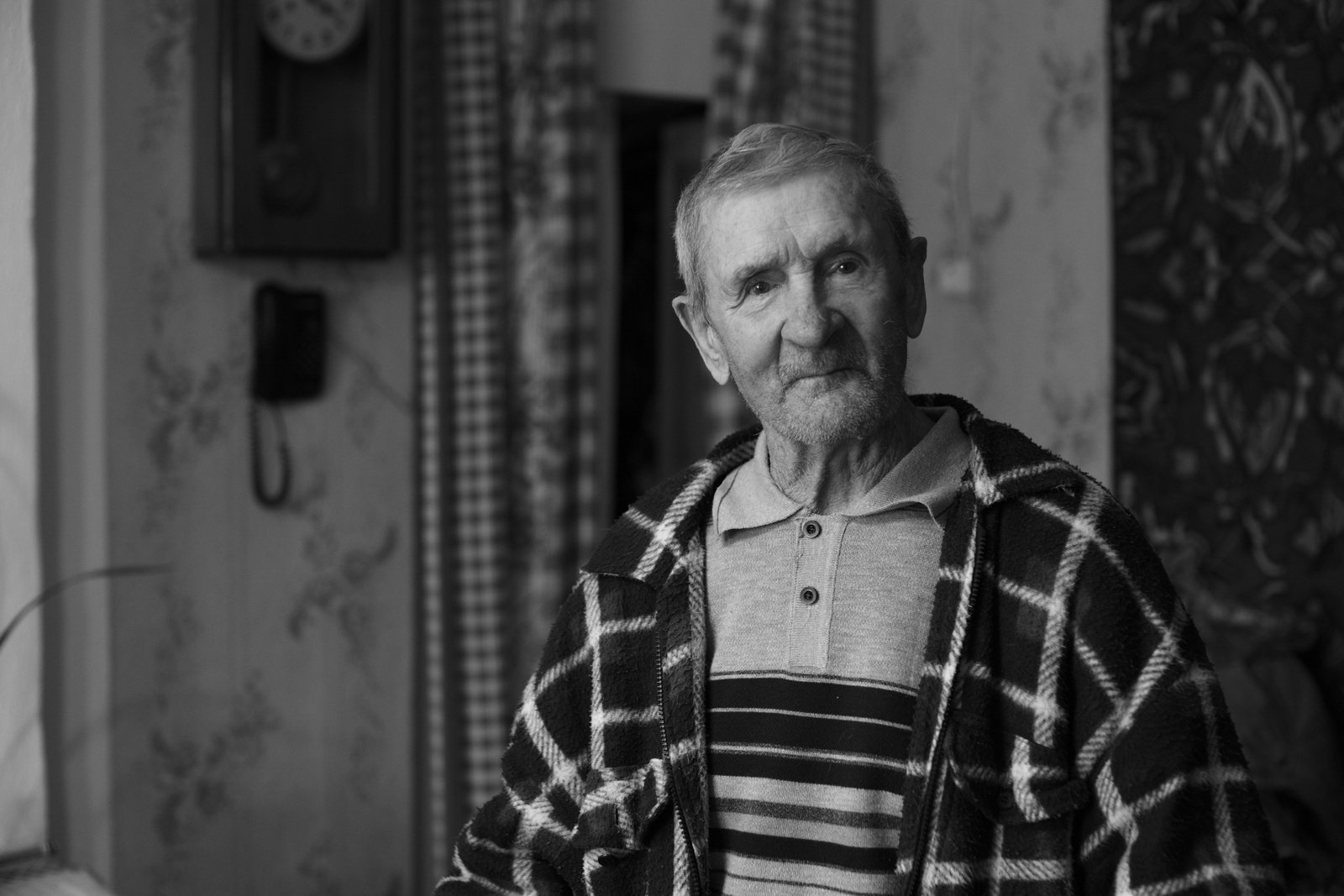
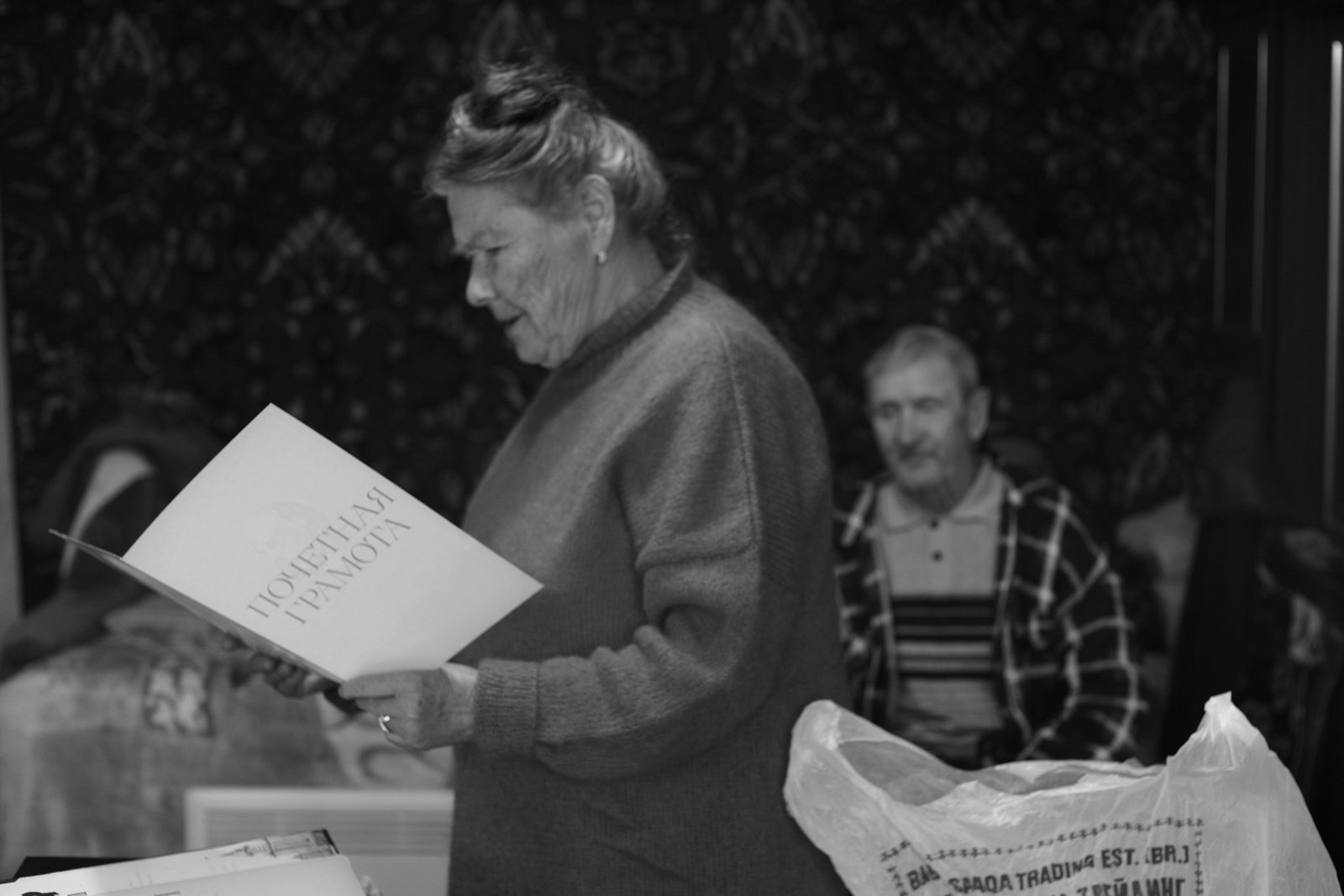
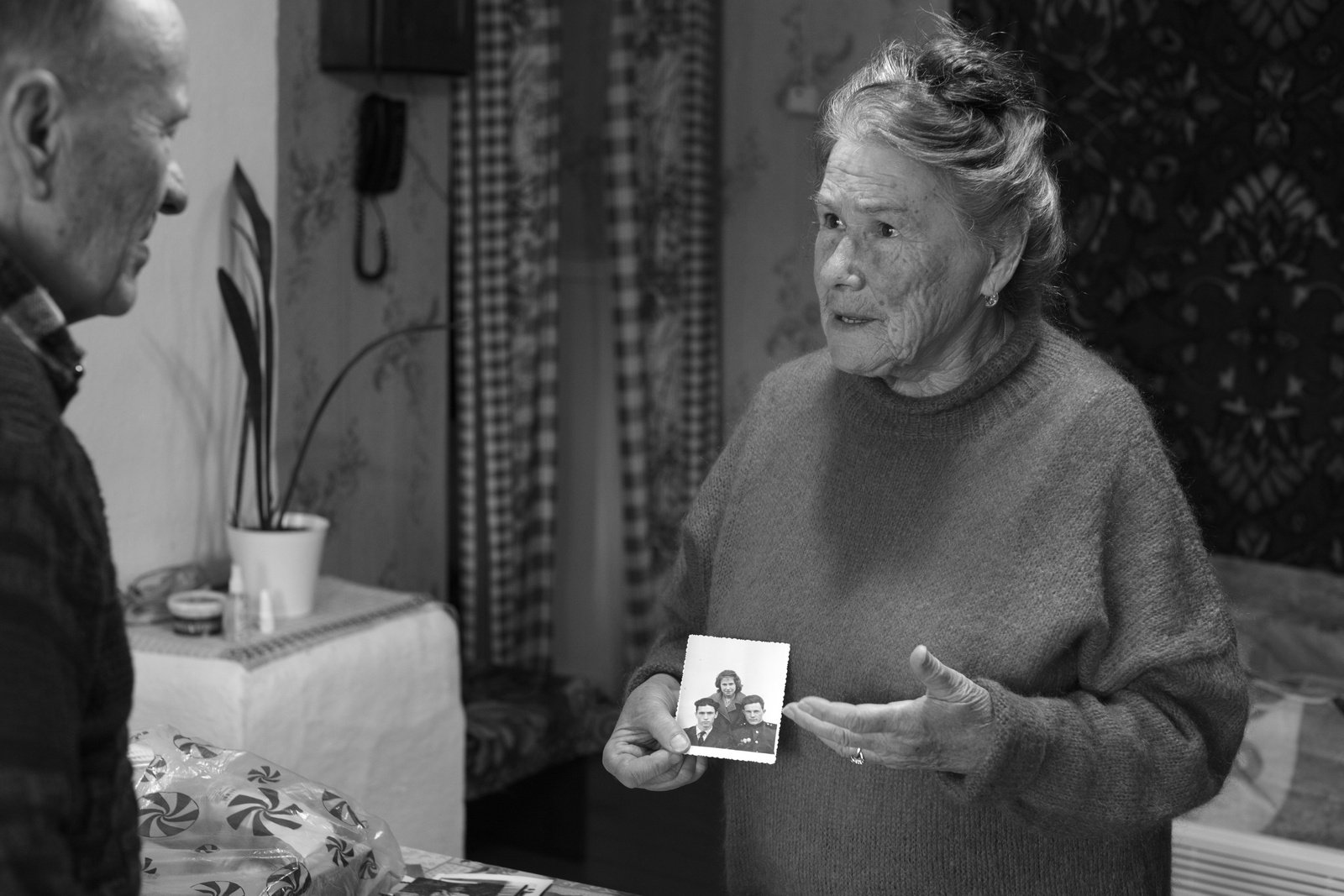
“
My father came back from the war, commissioned off after he sustained an injury, for a while we lived in Yakutia, and then we came to Kajy-Say, my mother insisted.
After retiring, he began working in the village as a photographer. There was a photo booth next to the restaurant «Volna» where he filmed.
"
Unfortunately, Eduard Petrovich did not see this publication. In March of this year, he fell ill and passed away…
The family of Alla Semyonovna’s nephew lives in the village. On the day of filming, returning from Bishkek, he visited the Alekseevs family, handed over the presents and an orchid from his granddaughter, who lives in the city.
There were many different clubs of interest in Kajy-Say.
One of the popular activities of the Kajy-say people was dancing, where one could meet Eduard Petrovich, Edik.
~
Kanat baike
.
Kanat baike, as we call him among friends, was born in Kajy-Say, in the family of a miner.
After graduating from the Pushkin’s Kajy-Say school in 1971, he got admitted to the Polytechnic Institute, majoring in mining engineering and hydrogeology.
He is the Headmaster of the Institute of Seismology of the National Academy of Sciences of the Kyrgyz Republic, Corresponding Member of the National Academy of Sciences of the Kyrgyz Republic, Doctor of Geological and Mineralogical Sciences, Professor.
He lectures once a year at the University of Oxford, England.
Kanatbek Ermekovich Abdrakhmatov
“
My first childhood memory. I love biscuits, crumbled in a bowl of tea and milk. I used to say: «Bloop-bloop-bloop!». It meant that I wanted to eat. I remember that moment. And the biscuits. I don’t even remember my mother.
I walk past a high wooden fence, with barbed wire on top. Summer. It’s hot outside. My taiene (grandmother from my mother’s side) is walking ahead of me with a bag on her shoulder. Being moody, I stop because I don’t want to walk. Taiene tells me off, comes back... Picks me up with one hand and hops me on her back. We go on. I’m happy.
"
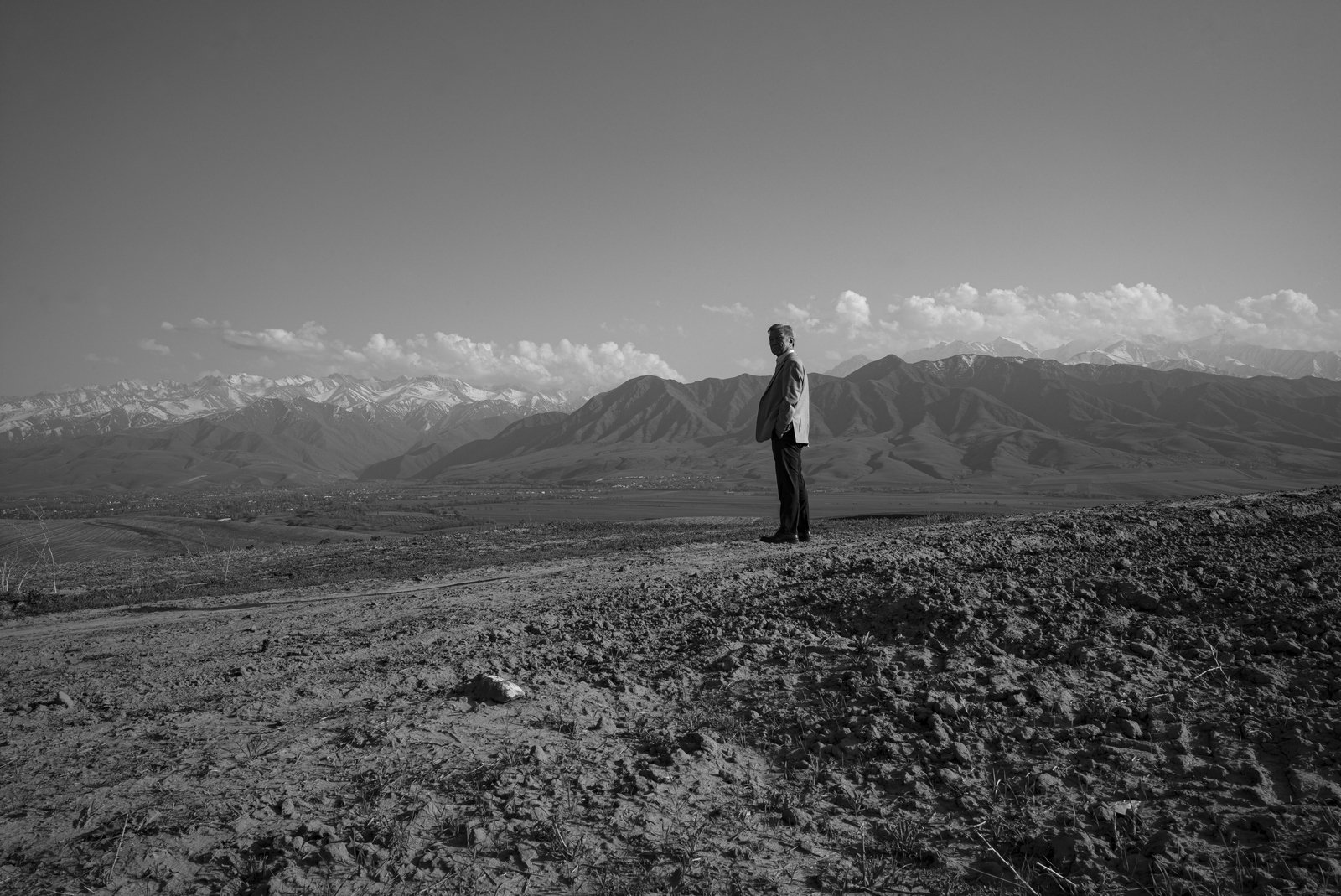
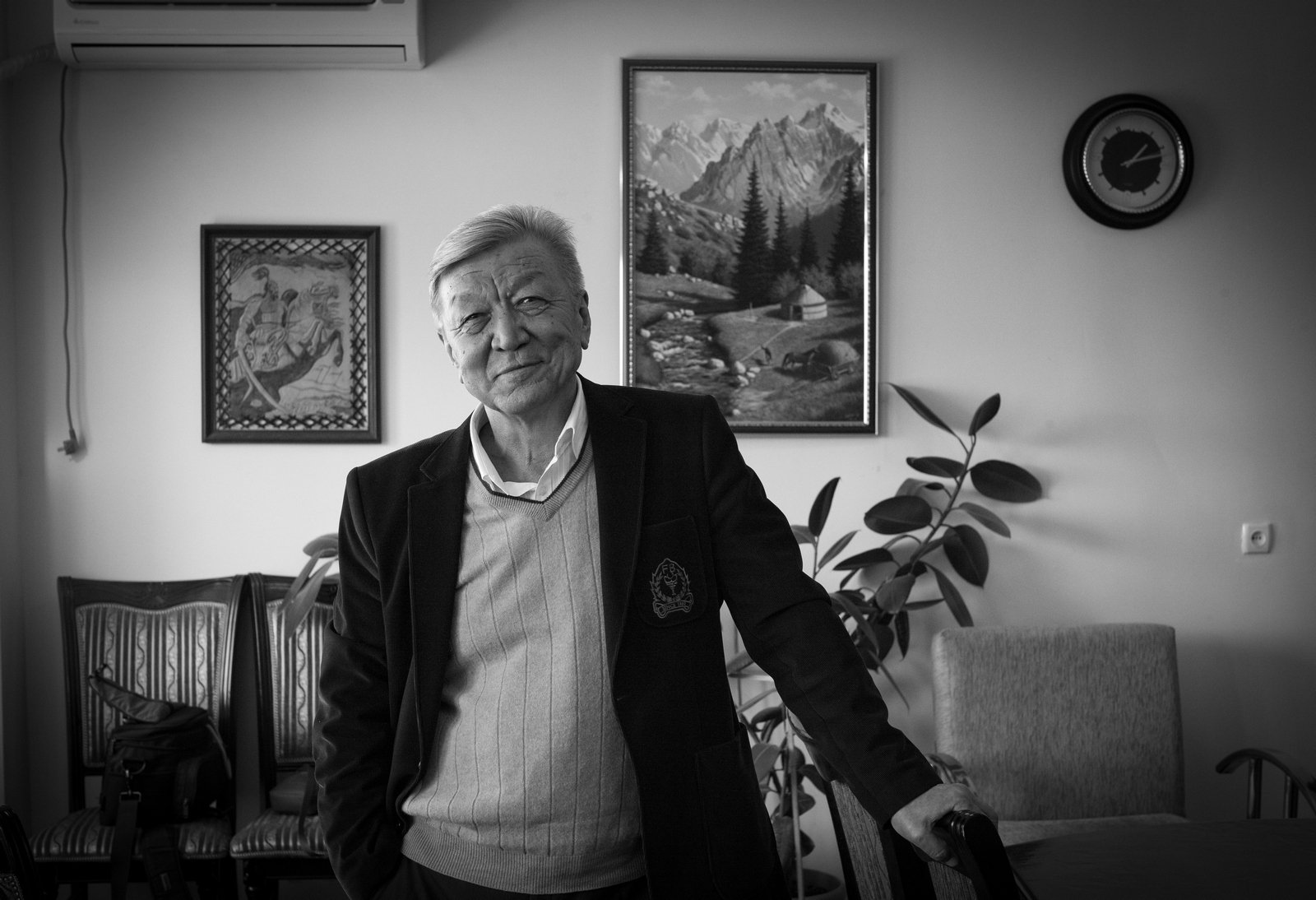
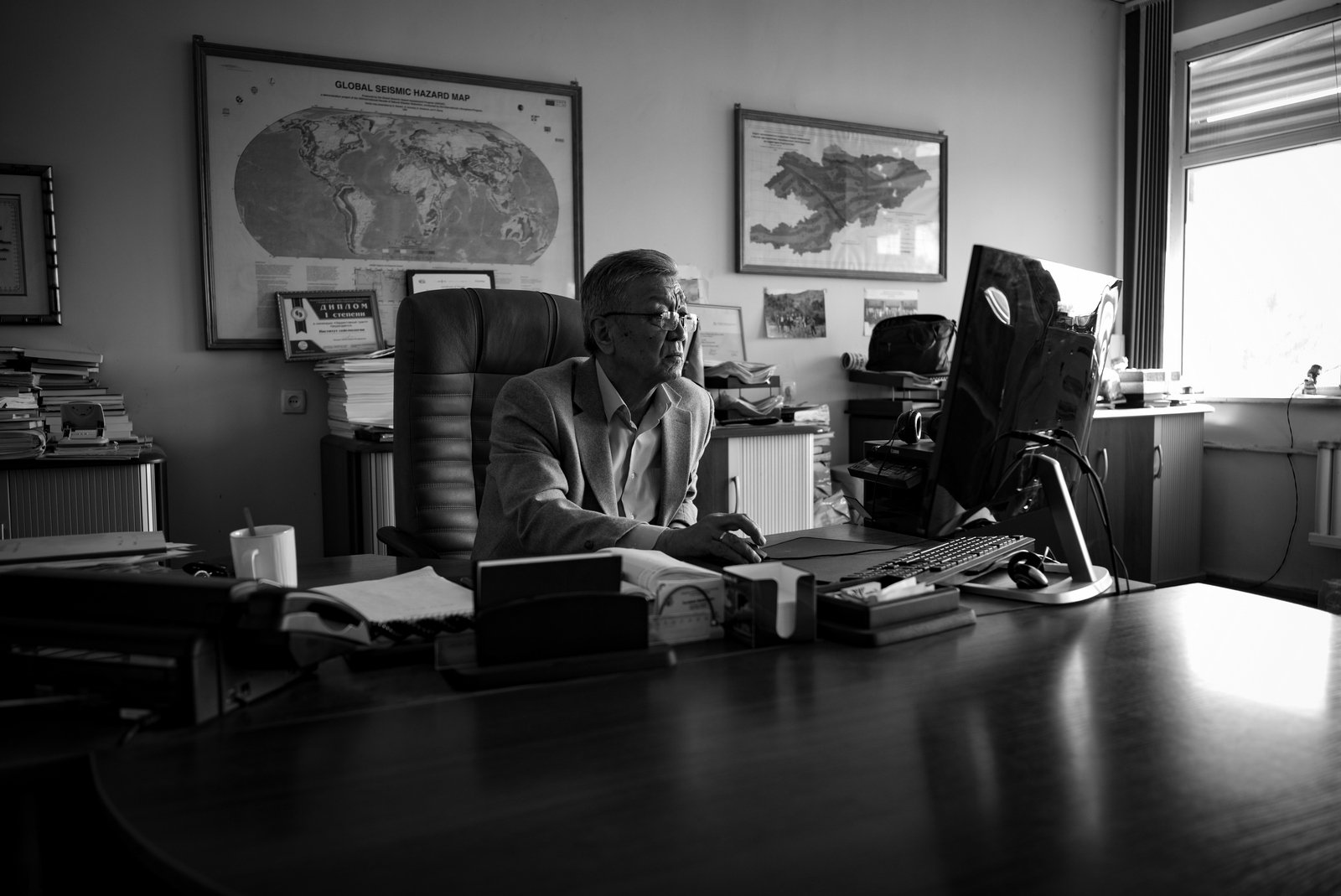
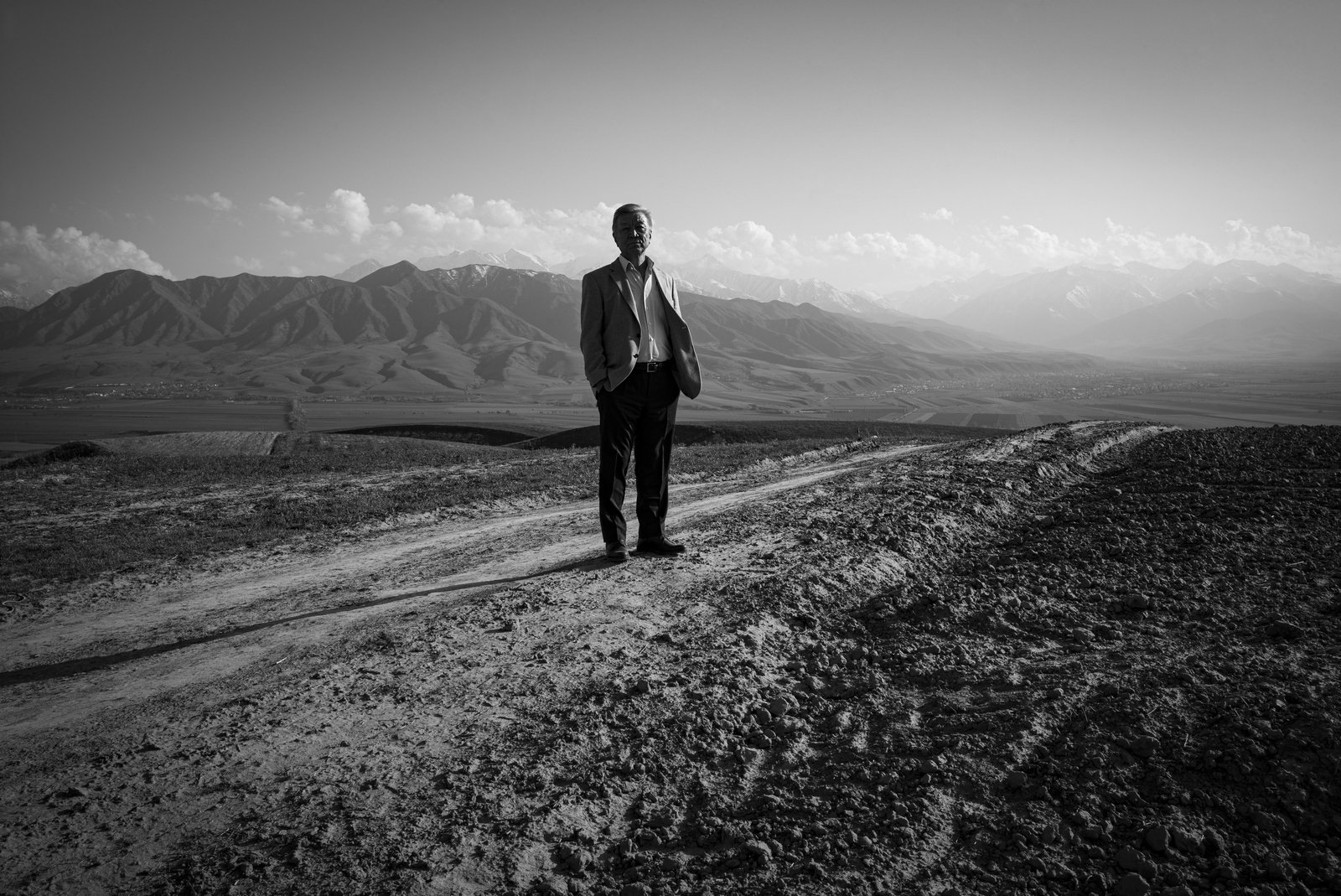
“
I have many brothers and sisters. I am the oldest one. I always had to get milk every morning. It was sold in a dairy store, which was housed in a semi-basement room, under a grocery store. The store would smell strongly of milk and cottage cheese. It’s clean and tidy. The saleswomen wore white bonnets and dazzling white coats.
There was a big counter with a huge yellow block of butter that was cut with a piece of wire.
Milk was brought in early in the morning and also there was going to be a decent line of people waiting...
Sometimes there wouldn’t be enough milk, although they brought a whole tank. I had to get up early and stand in an endless queue. The milk runs down the hoses from the tanker into some bottomless tanks in the store. White drops drip from the cold iron side and drip onto the morning tarmac.
"
“
We would usually walk to the lake. First we walk along the road of Issyk-Kul, through the tunnel of trees, and then, below the local public banya, on the clay hills.
Here we take off our shoes and walk barefoot to feel how hot and smooth the surface is.
This is one of the feelings that gives you happiness when you think of Kajy-Say.
"
“
There was a building in the village called the Polit Department. I don’t know its purpose still.
Furthermore, in the post office building, there was a police department, which was then, in my childhood called the ‘Gauptvahta’.
"
___________
“
The school. The only place that was interesting to visit. Probably because there was nothing else. True, there is still a club... but there... in order to watch the movie, you had to pay. But everything at school was free.
"
“
I come home after school, throw my briefcase, change my clothes quickly, cut off a big piece of bread, put a thick layer of apricot jam on it and go outside, because I saw the neighborhood kids playing 'alchiks'. I walk up with a serious look and try to take a bite out of my "hamburger". A neighbor kid runs up to me saying "Give me a bite!" I give it to him, holding my finger to the boundary where he can take a bite! Cause I know this one can take a half with one bite! Another one comes up with the same "Give me a bite!" Regretfully looking at the rapidly diminishing sandwich, I measure out a piece with my finger and shove a piece in his mouth! He takes a bite, wipes his mouth with the back of his hand and goes on playing.
I know that tomorrow if they have the same sandwich, they will give me a bite too.
"
___________
“
At school we were told that there is no God and also that communism will still be in 1980. And then everything would be free. I still could not believe that you could just go to the store, which we called «Hlebnyi» and just take a bar of chocolate from the shelf.
And I was also thinking that maybe one bar wouldn’t be enough for me.
"
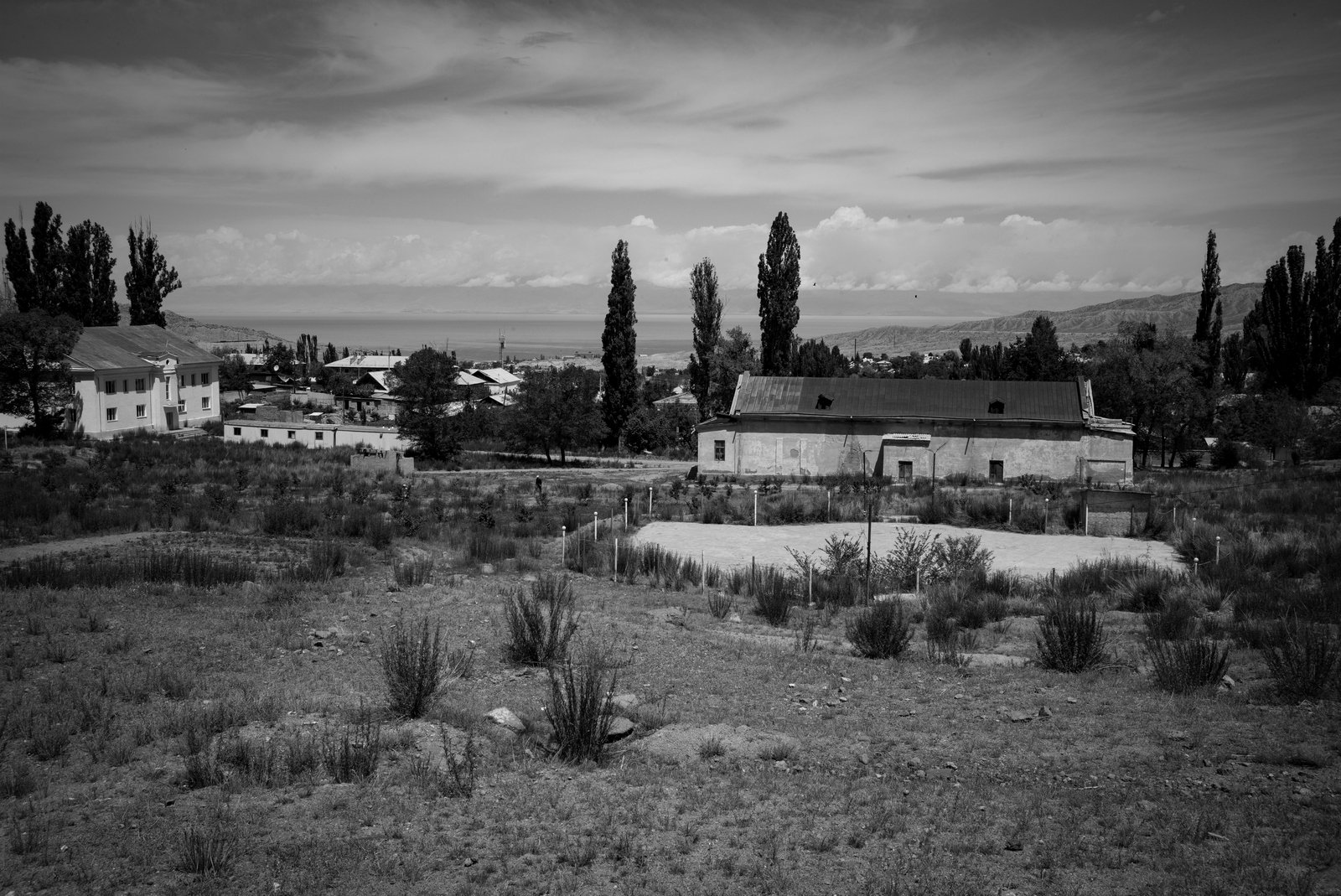
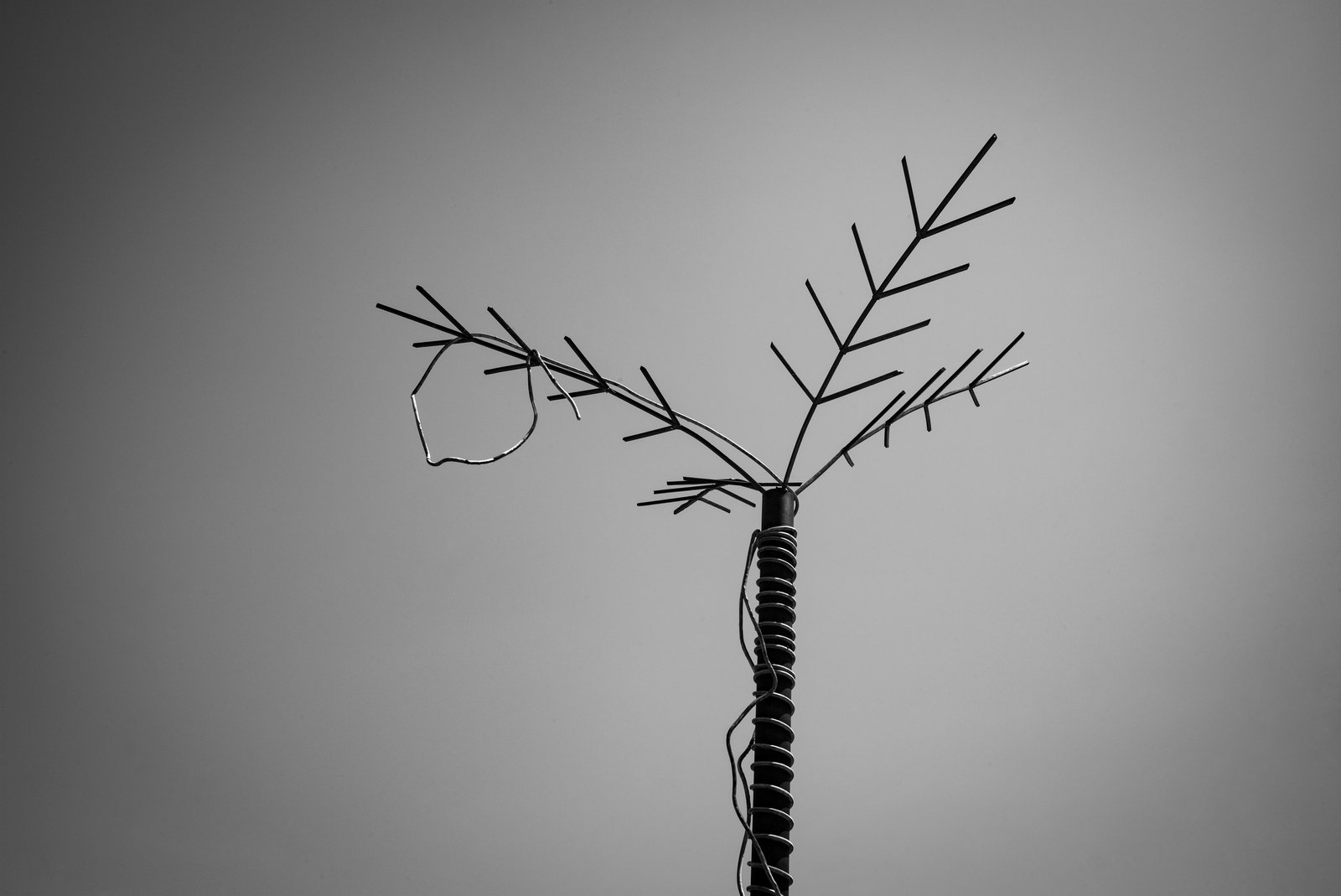
“
I already said that the park was very full of greenery. A stranger could easily get lost in it. Sometimes I’d go to the end of this park, climb a tree and sing, enjoying the atmosphere and the echo! I liked the song «The Twist» by Hank Bellard, and I was imitating Chubby Checker, who performed this song... I was screaming at the top of my lungs, not knowing that it echoed all over the park. Over time I became famous in the village and not only because of this song!
Kanatbek Abdrakhmatov
"
~
